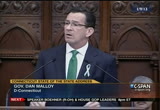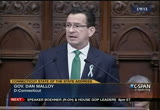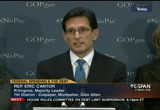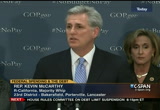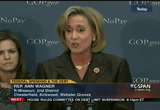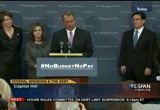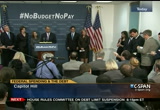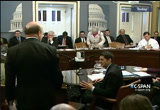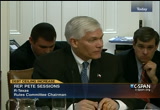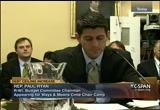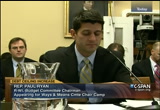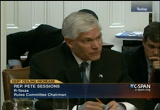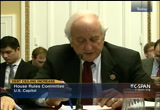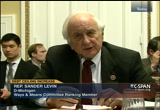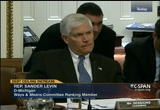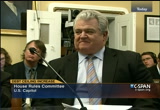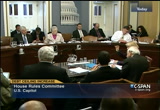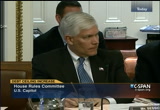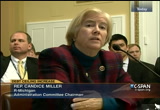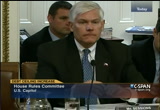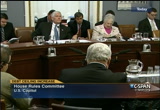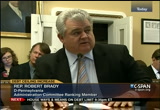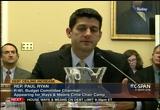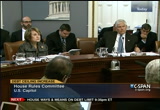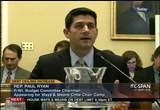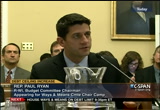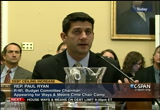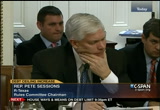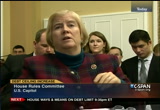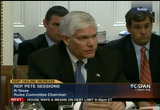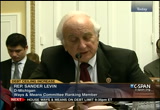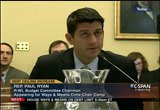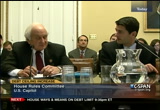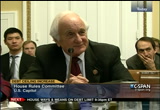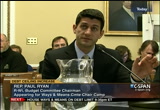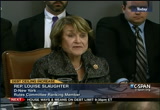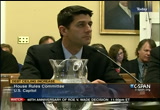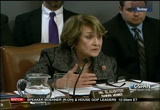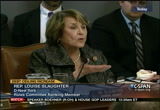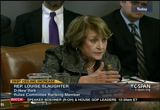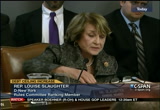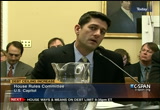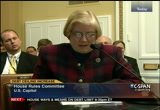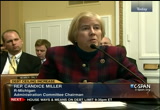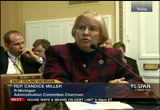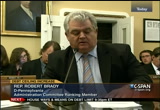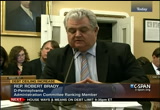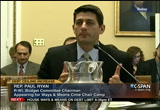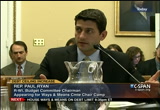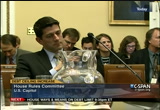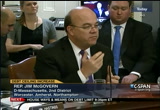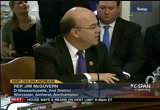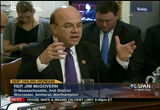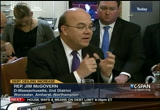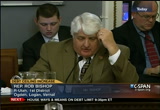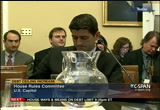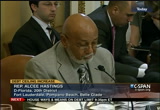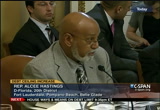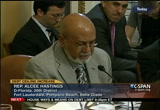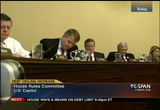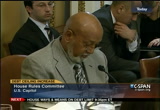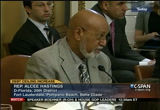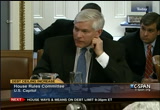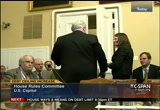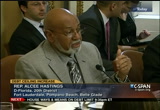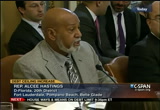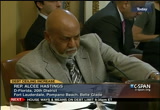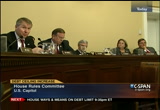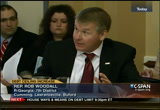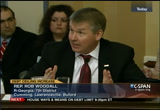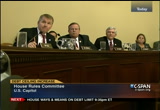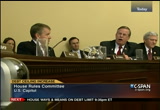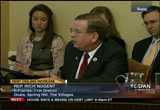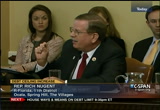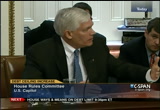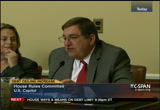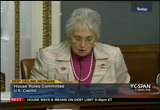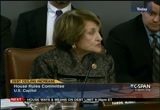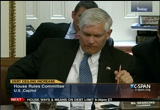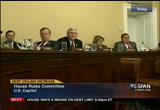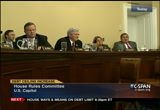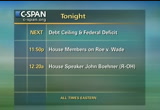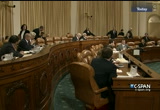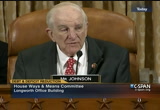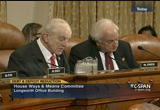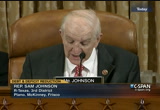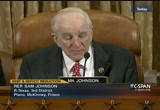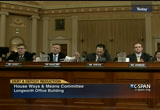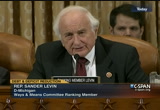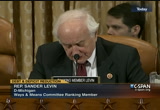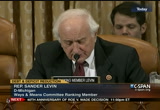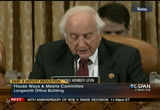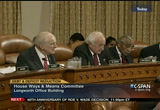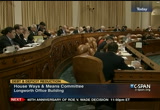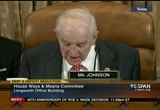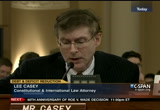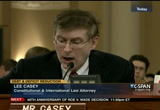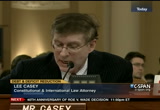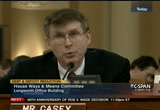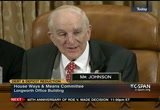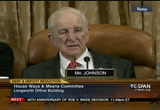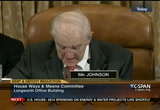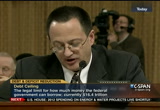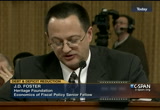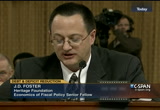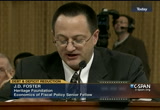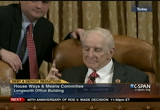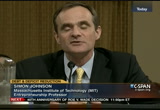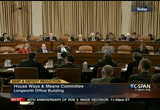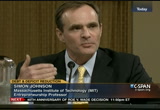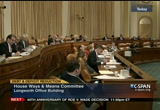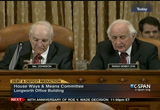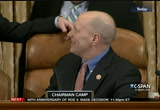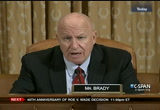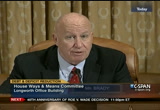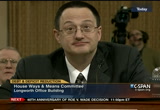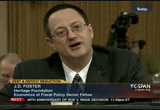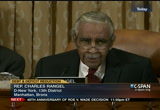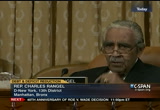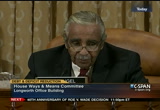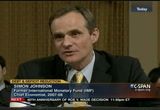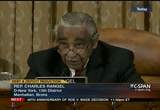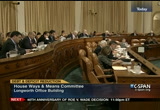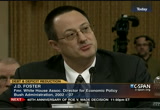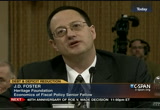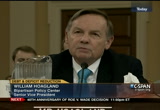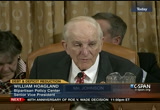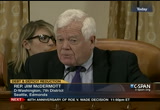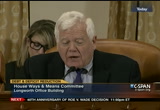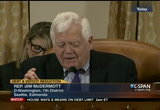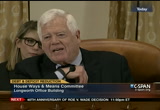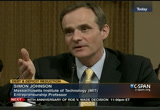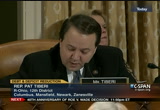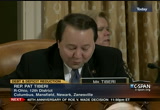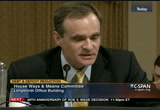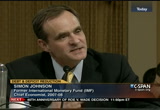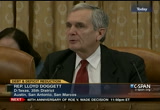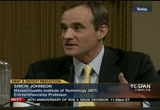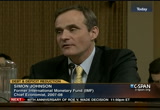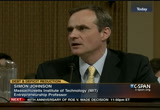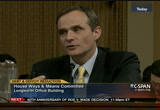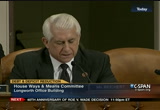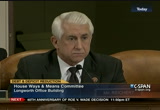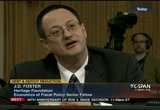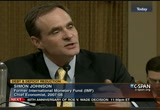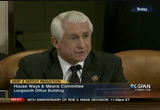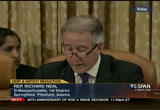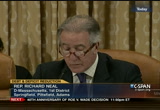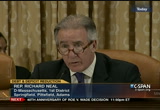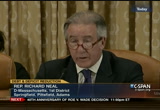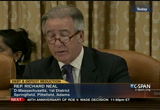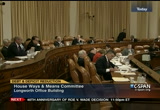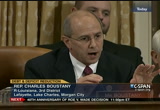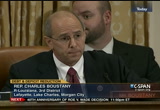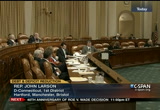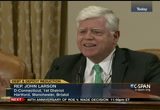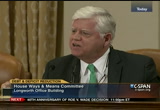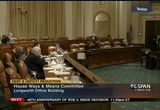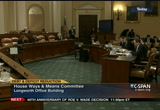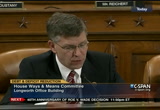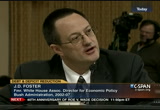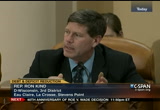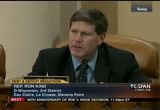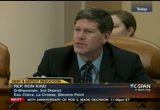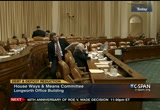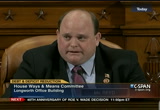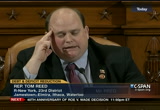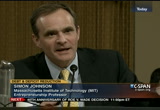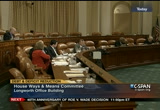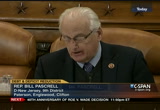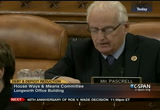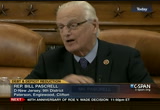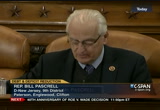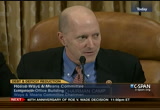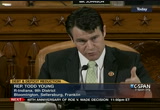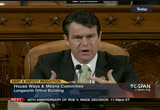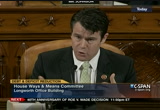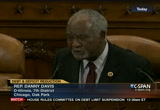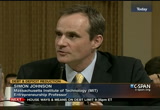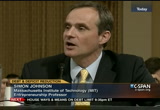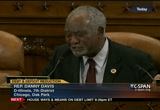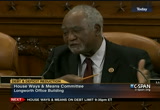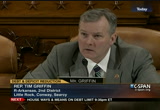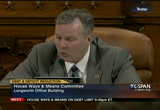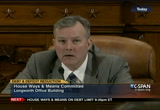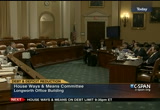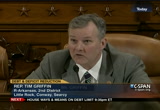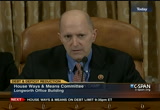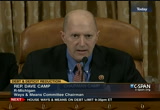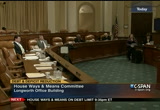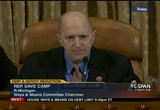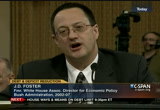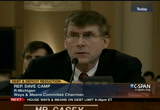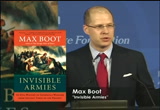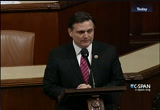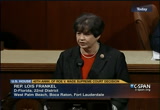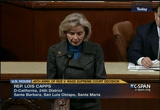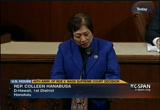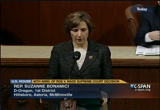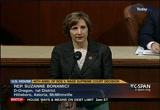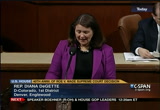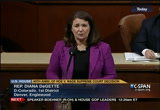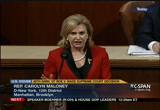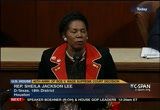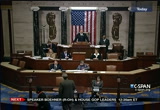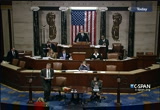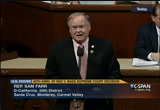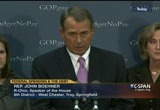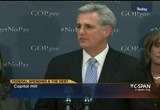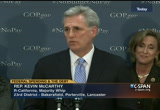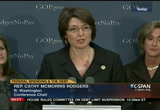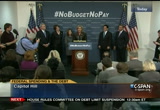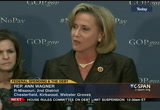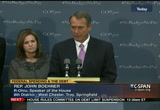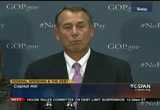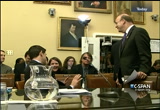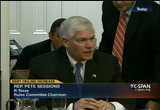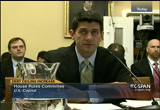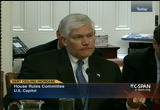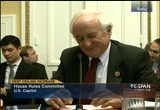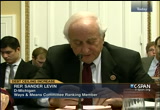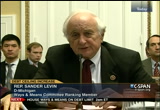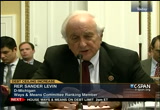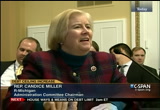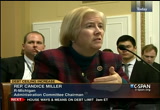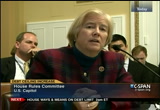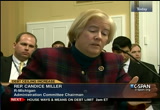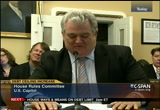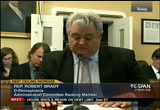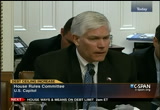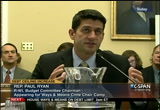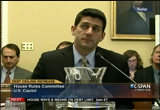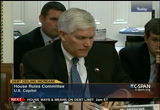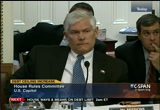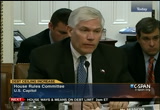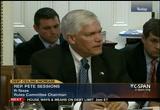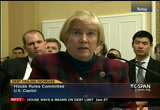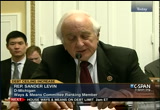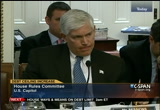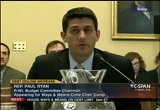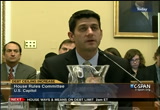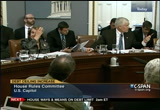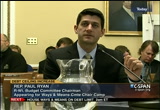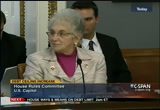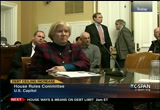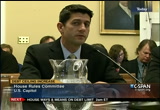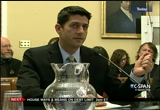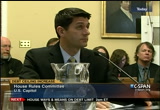tv Capitol Hill Hearings CSPAN January 22, 2013 8:00pm-1:00am EST
8:00 pm
i spoke about who we are as a community. about the ingenuity, the resolve and the resilience that has defined connecticut for centuries. about eli whitney and prudence crandall and harriette beacher stow. about a history of overcoming challenges together. my friend, that is still who we are today. .challenges together. that is still who we are today. we have come along way in two years and we have done it together as a government, a community, as a state. in 2013, let us honor one another. our renewed community. let us honor those we have lost. we have a great deal of work to do. but if history is any judge, we will rise to the occasion. when called upon, we will answer as we have done time and time
8:01 pm
again. as one people, one community, and one connecticut. [applause] as we begin our work which will take many months, may god bless each and every one of you. madoff last the great state of connecticut and the united states of america. -- may god bless the creek state of connecticut, and the united states of america. [applause] >> on c-span2 night, house speaker john boehner and house republicans discussed federal spending in the national debt. then the house rules committee.
8:02 pm
a house ways and means committee and why he thinks the debate should be different -- separate from the talks. house speaker john boehner and other house republicans briefed reporters on a vote on the debt ceiling. the house will vote wednesday on a measure that will occur -- extend the debt limit until may 19. included is a provision that if congress fails to pass a budget by april 15, lawmakers salaries will be held in escrow. this is 10 minutes. >> good afternoon.
8:03 pm
good evening. >> hard-working taxpayers understand that they have to balance their budgets from every week to every month. they also believe it's time for washington to balance its budget. over the last four years, house republicans have offered plans. our budget plans. we have done our budgets, but it's been nearly four years since the senate has done a budget. most americans believe if you don't do your job, you shouldn't get paid, that is the basis for no budget, no pay. it's time for the senate to act. chairman paul ryan has worked hard with the budget committee to outline the kind of reforms we would put in place to bring real fiscal responsibility here in washington. and the american people understand that you can't continue to spend money that you don't have. it's time for us to come to a plan that will, in fact, balance the budget over the next 10
8:04 pm
years. it's our commitment to the american people and we hope the senate will do their budget as they should have done over the last four years. >> good evening. as the speaker said, our conference will look to vote on a measure tomorrow that will temporarily extend the debt ceiling so that we can see the senate actually begin to do its job. for several years now, i think it's about four, the senate has not passed a budget. and all we're saying is, if the president and the senate -- if this country needs to incur more debt, senate, please show us your plan to repay that debt. please show us your plan to control spending. it's about time that we come together, do our work, the american people expect no less. that's why we'll insist on the house, no budget, no pay going forward.
8:05 pm
>> one thing every household looks at is how to spend their money. when you look at the crisis that you're in, the first thing you look to is where should i spend or even invest to make myself in a better place. the first fundamental responsibility of any elected official is to pass a budget. now when we took over in the house in four months, we passed the budget, many of you have said, was one of the toughest ones to come out of the house. higher vote than at any other time in the last decade. democrats said we are going to do political damage to you in the election. you know what? we were honest with the american public. where we currently stood and our budget wasn't about just today but tomorrow, but about securing medicare and building for a better future for your children. what's the history in the senate?
8:06 pm
last time they passed the budget, the ipad hadn't been introduced. we have had trillion dollar deficits every year. nobody would expect to be paid if they didn't do their job. no budget, no pay. if harry reid cannot pass a budget, they are fundamentally moving the responsibility why they should even be in the majority. to me, this is a turning point for this country, getting to the fundamentals of a planning for the future that this could be the mark of a great american comeback. >> good evening. yesterday, the president was inaugurated and he took a similar -- he took an oath of office that is very similar to the one that we take as members of congress, to uphold the constitution and to protect this country.
8:07 pm
and it starts with getting a budget in place. that is pretty fundamental to governing and the federal government is operating right now with a continuing resolution. and we need a budget in place. we need a senate to pass the budget. it's going on four years since the senate has passed the budget. the senate has said his budget is going to be delayed. america, families understand they need to pass a budget. you may not want to do it, but you have to figure out how to balance the budget. businesses have to do it. as we move forward, it is fundamental to make sure that seniors have the confidence that the federal government is going to meet the obligations that they have committed to, that hard-working taxpayers that want more take-home pay will have that confidence, that children will have more opportunities moving forward. this is our commitment and moving forward to get this
8:08 pm
budget in place and tomorrow we're going to pass our no budget, no pay. >> the fact that we're here today to debate raising america's debt limit is a sign of leadership failure. it is a sign that we now depend on ongoing financial assistance from foreign countries to finance our country's reckless policies. this is robbing our cities and states of critical investments and infrastructure like bridges, ports and levees. every dollar we pay in interest is a dollar that is not going to investment in america's priorities. instead, interest payments are a significant tax on all americans, a debt tax, that washington doesn't want to talk about. increasing america's debt weakens domestically and internationally. leadership means that the buck stops here.
8:09 pm
instead, washington is shifting the burden on bad choices today onto the backs of our children and grandchildren. america has a debt problem. and a failure of leadership. americans deserve better. all of those words were taken from then senator obama's statement before he voted against raising the debt ceiling in 2006. truer words cannot have been spoken today. the debt burden the president was concerned about a few years ago is still a very real threat today. congress should pass a responsible budget so we have a road map to get to our serious debt burden. no budget, no pay. >> i'm not sure i need this stool, but i'm a freshman. i'm new. i was sworn in just three weeks ago today and as a new member of the 113th congress, i know how
8:10 pm
they do things in washington, d.c.,. i know how they do things in missouri's 2nd congressional district. i'm a mother of three kids and have small business roots and all i know is that every family, every household, every business, every individual must have and pass a budget. we must live within our means. it is past time, way past time for the united states senate to pass a responsible budget that is going to put us on a path towards prosperity and is going to grow our economy and is going to create jobs and increase the standard of living for hard- working, middle-class americans. you know, we talk so much about mortgaging the future, mortgaging our children's future and i care deeply about that.
8:11 pm
but frankly, we are mortgaging now the future is now. and we all -- all of us here, we want to fight. we want to fight for that nurse, that carpenter, that teacher, that grand parent, that parent, that student, we want to fight for everyone across this country. and the 113th congress has been sent here i think to be do big things, the hard things, and this is the first step in that process. no budget, no pay. >> questions? >> speaker boehner, yesterday in the president's inaugural address he suggested that immigration and climate change will be top priorities for him. what do you think of his call for action on climate change, and is immigration a high priority? >> there are a lot of priorities for the congress. a lot of priorities for the president. and right now, the biggest issue
8:12 pm
is the debt that's crushing the future of our kids and grandkids. hard-working taxpayers understand you can't keep spending money you don't have. we will continue to focus, especially here in the next 90, 120-day period or fiscal responsibility to washington. >> a major position deals with the 27th amendment. 20 years ago you were instrumental in passing this amendment. based on the way that this bill is structured now and the provision in the constitutional amendment that calls for convening of constitutional conventions, will this have more teeth in it and hold members of congress hostage? >> you can't go months and months without a pay check. and what this does is basically says your pay gets escrowed and put on hold until such time as you pass a budget. >> senator mcconnell earlier
8:13 pm
today speculated, maybe not speculation, not a single republican vote in congress for any revenue whether that be tax loopholes or tax expenditures. is that your assessment for the house republicans? >> everybody on our side is not interested on raising taxes on the american people. the time to deal with serious problem, which is spending. [inaudible question] >> we are not going to raise taxes on the american people. >> complications with the white house -- [inaudible] >> you went on a big p.r. campaign last summer to say the president was responsible for the sequester. why is this a hostage that you are willing to -- >> the house has already passed
8:14 pm
a bill to replace the sequester. that is another possibility we could do. the sequester is arbitrary. but the fact is that when the sequester goes into effect, the 302 spending number comes down dramatically and it will have a dramatic effect on people's attitudes here in washington and they may get serious about the mandatory side of the spending equation. thanks. [inaudible question] >> mr. cantor? >> the house will vote on a bill monday. allowing the government to continue borrowing. the house of rules committee met to discuss a plan which requires both chambers of congress to pass a budget plan by april 15 or have their salaries withheld. this meeting is an hour and 20
8:15 pm
minutes. >> i want to welcome our -- three of our four witnesses that are here. it's always a fun thing to see a star of the show, everybody wants to get their autograph. mr. chairman, welcome to the rules committee. we're delighted that you're here today to discuss h.r. 325, a very important bill. and i noticed the former chairman of the committee, the ranking member, is here. we also welcome her testimony that will begin. we'll give mr. brady a chance to get here, but the chairwoman, the head of the house administration committee, the gentlewoman from michigan, and delighted that you are here. as always, the rules committee is delighted that you've taken time, both we were excited about your presence today.
8:16 pm
a chance for you to be before the committee and to talk about our business and the important work that we do here in the congress as we prepare for a vote tomorrow. and as always, without objection, we'll accept your words that you wish to put in the record. if you wish to summarize or give us your testimony now, the gentleman from wisconsin is recognized. >> thank you, mr. chairman. yeah, i'll ask unanimous consent that it be included in the record. >> without objection. >> i'm here on behalf of my chairman, chairman camp, as the committee of the ways and means committee. this is in the jurisdiction of the ways and means committee, that's the hat i'm wearing here. this legislation accomplishes two things. the short-term increase and ties the debt limit increase to our budget process. it provides that if each house of congress has not passed a budget resolution by the statutory deadline of april 15, members' pay will be withheld until that house passes a budget.
8:17 pm
this is based on the cooper bipartisan legislation of the 112th congress. i wish we weren't here in this position. the reason for this short-term extension is to just get congress to actually follow the law that congress wrote in 1974 which is to pass a budget by april 15. we're not saying what kind of budget they have to pass. just pass a budget. reason is the senate is going on four years now for not having passed a budget. we think this gives us the time we need in this nation to have a good thorough, vigorous and honest debate of what it takes to get our fiscal house in order and about how to budget. families budget. businesses budget. our federal government should budget. we actually have a law that says we should budget. all we're saying is follow that law and that's why the short- term extension before you today. i'll let the rest of it speak for itself. >> thank you very much. mr. levin. >> first, welcome, mr. chairman.
8:18 pm
>> thank you. i think this is the first -- >> i think this is the first time i have been before you. the first time any of us has been in the chair. >> thank you. i hope i'll do good enough and make you want to come back. >> i'll come back whether i want to or not. \[laughter] >> we still welcome you being here. by the way, for both -- all three of you, please note we have several new members down all the way at the end, the gentleman, dr. mike burgess, chairwoman ileana ros-lehtinen, and then the young member from oklahoma, tom cole, who is coming back on the committee. and we're delighted. we hope we once again greet you with the respect that we do, this ways and means committee, the house administration committee. we'll see if we can change your opinion a little bit. >> no. and thank you very much. welcome to the new members, including one young veteran who has chaired another committee.
8:19 pm
let me be very brief because we've been through this before in the summer of 2011. the house majority here toyed with the debt ceiling. and the ramifications were i think not only serious but severe. in terms of job creation, august of 2011 was the worst in the last three years. the market plunged in those two months 2,000 points, and it had in that period the worst single day drop in history. on august 8, it was looking at my notes on very exact, 635 points.
8:20 pm
the treasury was forced to spend well over $1 billion in interest payments, and i think we all remember so vividly that there was a downgrading of our credit rating. so a postponement of three or four months has more than the potential of some very serious consequences. and so we urge very much that as this committee considers this bill that you remember what happened before, only 18 months ago, and i think you seeing the debt ceiling -- using the debt ceiling for leverage is a mistake.
8:21 pm
i'll finish with this, because we were at the ways and means committee and i gave the opening statement, and one of the witnesses are talked about gramm-rudman. it was attached to a debt ceiling bill. i was among the democrats who voted for it, but it passed -- it was deemed passed in the house. and the debt ceiling bill was used by senators as a vehicle, not as a threat. and not for leverage but as a vehicle to attach deficit reduction. so the use of the debt ceiling for the purpose that is ascribed to this one does not have a history that supports its use for this purpose.
8:22 pm
and so to the extent that you have the ability to look at this issue, i would urge that this is not only a dangerous precedent but a very likely problem for the economy when we need to emphasize economic growth and jobs. so i say that in a somewhat sober way because of what happened before. thank you. >> thank you very much. i'd like to welcome mr. brady, former chairman of the house administration committee, who's joining us today and our new chairman -- chairwoman candice miller, will be recognized at this time. chairwoman. >> thank you, mr. chairman. and i also am delighted to see you sitting in the seat there and welcome to the new members of the rules committee. i feel like i got florida covering my back over here. yeah. got your back.
8:23 pm
and i'm delighted to sit next to my good friend and colleague, sandy levin. interestingly enough, sandy and i actually share act. sometimes you hear the term, reagan democrats. it was from our county. you have two. you have two very divergent beliefs coming out of a county. but one thing that is a very commonality of think of a county like mccomb, is we have budgets. we pass budgets on time. we balance them. we just think you should have a budget. interestingly enough, just before i came here, before we had our vote series, i was doing something i call congress in the classroom where i was going to call it skype, but it's the new technology as uvo.
8:24 pm
i talk to all these kids in my district, my part of the county, about things that are going on in congress. i was telling them about this particular piece of legislation that was going to come before the congress tomorrow and tell them that the senate had actually not passed a budget in almost four years. they said, how could that be? isn't there anything you can do to force that? i said, we're going to try tomorrow and it's unfortunate it has to come to that. whatever kind of budget the senate would pass, obviously the house republicans would very vehemently disagree with it. however, it's a way to begin a negotiation. where you're not negotiating with yourself. i think most folks, whatever business you might be involved in or a government entity or your own household, a budget is a blueprint, it is a blueprint for a path forward to your spending priorities and how you proceed. i appreciate all the work done by my colleagues on ways and means on this as an important piece of legislation. i just came to add my voice to associate myself with the remarks of my colleague, mr. ryan.
8:25 pm
but i would also mention the caveat that has gotten a bit of attention is the no-pay clause without having the senate or the house, either respective chamber, not pass the budget and whether or not that meets the constitutionality, the confines of the 27th amendment. i'm not a constitutional attorney. i am not an attorney of any type. we've -- our committee has looked at this quite a bit on our side. we think that placing the members' pay in escrow until such time as that particular chamber passes a budget is constitutional. it meets the constitutionality of the 27th amendment. as long as we -- the member actually is paid by the end of the 113th congress. there's been some questions. somebody asked me just on the floor actually for instance -- let's say, you know, x amount of times passed before the payment would be made whether or
8:26 pm
not that congress should be -- whether or not the escrow account would be accruing interest for the members and if the interest is not accrued, would that be a problem with the 27th amendment? but interest on any kind of federal spending in escrow or whatever has to be done by a specific statute and there is nothing in the statute for the 27th amendment to require that. so i think -- i feel very confident that the 27th amendment and the constitutionality of that would be upheld with the bill that the house will be focusing on tomorrow, and i look forward to its passage. thank you. >> thank you very much. mr. brady. >> yes. thank you, mr. chairman, and ranking member. congratulations to you, mr. chairman. >> thank you very much. >> i will miss mr. dreier. but i'm sure -- >> you sound a lot like mr. levin.
8:27 pm
he wanted david dreier back. >> no. i think i can -- i think i can get along with you too. but he was -- he was fun to watch. he was. i got along with him well. i liked him. but, mr. chairman, i believe that congress needs to raise the debt ceiling to honor our commitments to our seniors, our veterans and that raising the debt ceiling is only about paying bills that we already racked up. i also believe the best way to achieve these goals is through a long-term balanced approach. it is not yet clear to me that this bill is a viable vehicle to achieve those goals. i, unlike my chairman, have not had a long enough time to look at this. our committee hasn't had a long enough time. we just got it this morning. so as you know we just received it.
8:28 pm
sorry. yesterday. considering the deals with how we fund the government, that potentially raises constitutional questions, i think it deserves a serious look. as we continue to -- i hope this committee will grant an open rule so we will -- so we can see if these improvements need to be made. we will have the opportunity to do so. house administration is responsible for the members' pay, component of -- many component of this proposal. among our concerns is the constitutionality, a section that's drafted. we know the 27th amendment -- whether or not this is a varying or not. again, i am not a constitutional lawyer. i am not a lawyer of either kind. i don't apologize for that. the compensation proposal may do just that. it's unclear what pay is withheld, how this impacts other benefits and a host of other considerations. as we continue to review the bill and its possible implications, we may need to improve the legislation. the only way we can accomplish that is by adopting an open rule and i encourage this committee to grant that and i thank you for your time. >> thank you very much, mr. brady. i have heard, too, overwhelming -- two overwhelming questions come up today and one is, mr. ryan, which i would ask you this question.
8:29 pm
the gentleman, mr. levin, really alludes to the uncertainty that's caused in the marketplace. and it was my real recollection without studying this very clearly i think what the markets and the analysis of that said was there's great damage if you don't address the issue as opposed to going through a deliberative process where both sides or all three sides deal with each other effectively to get it done. what would be your take on this issue? >> having met with the rating agencies and having met with the people at the rating agencies, it wasn't the fact that we were having the debate. it was the debate would not result in fiscal consolidation, as they would call it. let me point to the evidence of fitch. fitch is a rating agency that recently put out a negative downgrade warning which said it's not that congress is going to have a debate.
8:30 pm
it's that the political system isn't working to result in fiscal consolidation and getting debt and deficit under control. it's this may not materialize in a result where we actually get our debt and deficit under control, and if we don't do that, then we'll probably have a downgrade. it's not the fact that we have political theater or a rank russ debate. it's the fact that if we don't get a down payment on debt reduction, then we'll have the downgrade. what they're doing is they're looking at the projections of our fiscal imbalance. the fiscal gap as they call it. if nothing results from this, because they conclude that the political system is broken, then they'll give us a downgrade. so i would argue it's really the mechanics and the math of our fiscal problem and the lack of a will to deal with that or results coming out of this place to deal with that is what's creating these downgrades. >> have you analyzed or paid attention to what the president would like for us to do on this, what his position is, mr. ryan? >> we obviously had talked with the treasury department at the white house.
8:31 pm
and the president's comments. he wanted to have the limit raised indefinitely, was his position, during the negotiations at the end of last year. tohe doesn't want congress have this authority. obviously we believe this is clearly authority that resides with congress. power of the purse. second point is what we're doing here is we're giving the administration the ability to meet the nation's obligations while we have the time to consider budgets. we have statutory deadlines. the president is supposed to submit his budget, the first monday in february. he's missing that deadline clearly, according to the president's budget people. congress is supposed to pass a budget by april 15. the house and the senate. in order to accommodate those deadlines so that we can actually have a very important, vigorous debate about how best to solve this fiscal gap, we need the time to do that and that's what this does.
8:32 pm
>> mr. ryan, do you believe it's in the best interest of this country for one or two people to be at the table to solve this or rather a more open process? >> that's the other point we wish to make. this is not something where you're going to fix the nation's immense fiscal problems with some back room deal. we want to commonly refer to as regular order. we think we should deliberate. we think we should go through the committee process. we think we should produce budgets that shows how we intend to fix this fiscal problem and prevent a debt crisis. the people who need government the most, the poor, the elderly, the sick, that's who gets hurt the worst. if you have a debt crisis, then you're cutting money indiscriminately. then interest rates goes up. people have a hard time paying their mortgage, student loans. that's the debt crisis plaguing europe. this is what we seek to prevent. what we want to do is go through regular order where every member of congress has their voice heard so that their committee and then their party, the republicans in the house or the republicans and democrats --
8:33 pm
democrats in the senate, they can produce a budget which will pass that will show the art of governing. the 1974 budget act is clear. there are parts i don't like. this one says you got to pass a budget. the congress should operate on a budget. we haven't had one for four years and that's because the senate has chosen not to pass one. we need to get back to the art of budgeting and have it through regular order and this is what it does. this buys us time so we can have the debate that fitch and the rating agencies says we need to have. how will we prevent a debt crisis? how do we make sure we don't leave our children and grandchildren with a burden of debt that will suffocate their futures? >> mr. ryan, today you represent the ways and means committee. however, you sit as the chairman of the budget committee for the house of representatives. is it your intent to move forward to do the same that we would be asking another body to do and that is produce a budget?
8:34 pm
>> the debt limit is jurisdiction of the ways and means committee. it is my intent, as i did last two years, is to produce a budget in the budget committee and bring it to the floor and pass it. i did it each of the last two years in fulfillment of the 1974 budget act and we anticipate doing the same thing again. >> well, on behalf of myself, i would say, as a fellow committee chairman, i applaud you for doing the hard work. i've been on the budget committee, served with you in the budget committee. it's a lot of hard work, a lot of long hours, but it produces things that gives people confidence that we're addressing those things. thank you very much. >> thank you. >> mrs. miller, if i could ask you, i've heard our two colleagues from the other side of the aisle really kind of allude to this five-page bill that we have before us today that i have read several times and i think i understand it but wouldn't it be true to say that the senate would have to agree to this if it were going to become something that they would have to live by?
8:35 pm
>> yes. >> so in other words, this is a document which we're producing -- >> has to go to the senate. >> so if they have problems with it then they would take up that issue and deliberate that. we're not in essence laying off on another body our own wishes. we're rather stating what we would like to do and we're placing ourself in the same position that we would be placing someone else. would that be true? >> we're putting ourself in position to follow the law. >> and also perform. >> if the senate passes it, they will be following the law as well, which, again, they have not done so in the last four years by not passing a budget. you know, it's interesting -- without naming any names, but we read some of the articles here where a number of the members of the senate, democrats in
8:36 pm
particular, have said this is a great opportunity for them to pass a budget. talk about tax reform or various kinds of things. the debt ceiling, the sequestration, etc., that really have not been addressed appropriately for the nation. so i think that is a good way to look at it. it is an opportunity to follow the law and do our jobs. >> thank you very much. i agree with you. i think both sides of this capital will have an opportunity to accept this bill, vote for or against it, to debate it and the merits within. i think we have seen where several prominent democrats have really accepted the challenge to get that done. mr. levin, did you want -- >> just briefly. my guess is -- >> the gentleman is recognized. >> we'll debate this tomorrow. just a few things. i'm in favor of regular order.
8:37 pm
that doesn't mean there's any guarantee of the result and to use the debt ceiling as a lever i think is a very serious mistake. after the credit of this country was downgraded, a senior director of standard & poor's -- this was right after it -- said the following about american political institutions that they were undermined -- i quote -- that people in the political arena were even talking about a potential default. and essentially this bill does that. and if i might say to mr. ryan, we're on the same floor. we talk to each other a lot anyway.
8:38 pm
i think it will be helpful in regular order if there were a budget brought to the floor of the house that had bipartisan support and was a product of regular order with strong bipartisan support in the budget committee and on the floor. thank you. >> thank you very much. >> we look forward to your support. \[laughter] >> mr. ryan. >> participation. >> a new issue has just been brought up by the gentleman and that is perhaps the timing, do you believe that this is timely and that you've given people an opportunity rather than waiting until the last minute and thus getting to a deadline and having to react? >> mr. levin and i are friends. >> he and i are friends. >> our intention, as before, is to write a committee mark, bring it to the committee, entertain probably at the 40 or so amendments, some of which we've taken in the past, and then to bring a product out of committee. there may be irreconcilable differences. that's the way things ought to be.
8:39 pm
there was one budget that did get a bipartisan vote. didn't get many votes. it was cooper and latourette and a few others. there was some bipartisan votes. got 35 votes or something like that. i hope it happens in this congress. there may be a moment where we'll have irreconcilable differences on how to solve these problems. at least in the house we brought budgets. mr. van hollen, to his credit, brought a budget and brought it to the floor, to his credit. that didn't happen in the senate. they didn't even attempt to do that. so the senate hasn't done that. all we're saying is let's get the senate in the game to do that so we can debate how to fix a problem, not whether we are
8:40 pm
going to try to fix a problem. >> mr. chairman, i have been handed a note saying i need to go to another for forum. >> i recognize that. and the gentlewoman, ms. slaughter, hears that. >> i should be there too. >> yeah, i'm next. i'll talk long so that you -- your turn is up after mine. >> let me ask very quickly if someone has a question for mr. levin before he goes. and anyone -- >> you have to leave. then i would not stand in the way of democracy. >> i think you'll give me leave. and the chairman will? >> well, as always, we want to reserve the right, as we agree with you, to at least give our members an equal shot and i see no member necessarily that has a
8:41 pm
question. >> i'll try to come back if you're still in session. >> the gentleman will be considered excused at this point then. >> thank you. >> ms. foxx. >> the resolution -- the bill that's been brought to us today, and i don't really want to repeat or ask chairman ryan or chairwoman miller to repeat the things that they said, but i do think it's important that we highlight the fact that the house, under republican leadership, has been adopting a budget. we have the last two years. and the senate has not. and there is a law that says we are to adopt a budget.
8:42 pm
chairman ryan pointed out that the president's folks have said they will not adhere to the law again this year. my recollection is they were late last year. i think they submitted a budget but my recollection is they were late last year. i may be not correct on that. >> they submitted a budget. they missed the deadline three out of four times. >> ok. so i think what's important here is we are the lawmakers, and it's important that we be good role models for the rest of the country. and we certainly are cast gaited on an individual level when we break the law. some people have. some inadvertently. some purposefully. but i think it's very important that we follow the law. so i think it's important that we continue to point this out to the american people and i'm very pleased that we're going to be
8:43 pm
doing this. raising the debt ceiling is a very, very serious issue. and we don't do this lightly. nobody i think should do it lightly. i believe that the way we are going to be doing this will help us move forward with working on the budget. i think you don't get the baseline numbers to -- until when, mr. ryan? >> the c.b.o. is late because of the end of the year fiscal issues. they anticipate getting their january baseline updated on february 4. typically you have a budget resolution off of c.b.o.'s rescore of the president's submitted budget. the president's budget is coming late. the administration has not said when they are going to submit a budget, so we don't know when c.b.o. will have the opportunity to score it.
8:44 pm
usually takes about three weeks to score it. then you get your final baseline with what you normally write your budget. so that's the issue here. timing. but since c.b.o. will give us their newer baseline, we call the january baseline, in february, that gives us something to start with. >> and i read an article the other day that says one of the things that resulted as -- has come about is the result of what we did january 1, i guess it was, was that we should not be having arguments about baseline. that we hope that's been cleared up and that will be a useful thing going forward. i know it is a difficult thing for you to explain and me to explain sometimes to people, but i just want to applaud you all for what you're doing and want to thank chairwoman miller for coming. and mr. brady, it's always nice to see you. thank you very much. i yield back. >> ms. slaughter.
8:45 pm
>> thank you, mr. chairman. first, i'd like to ask unanimous consent to put the administration's statement of policy in the record. >> without objection. >> and you know, we all started out, everybody's friends. you are friends with sandy. and i want to be your friend. i got to tell you, friends, i am not sure what it is we're doing here today. this was filed yesterday morning, 7:00 on inauguration day. i read the article, which i assume was -- everything i heard was the father of this idea. and -- but the fact is the democrat party has been totally left out of this. we keep going down the road here, sort of lurching and jerking about. sort of like plan b. leaving us out, calling us up to the rules committee where we all sit up here, sitting up higher than everybody else, looking so we really know what's going on. we really have about had it.
8:46 pm
there is nothing called regular order. we talk about it all the time. we talk about budgets being law. we read it this week. this is a step too far for me. i really think what you're doing here, while i appreciate it as well as i think everybody else, on my side of the committee, that the idea of dollar for dollar business seems to be gone. we're glad for that i'm not really clear. we pass the law. we think that the senate will pass the same bill. is that the same idea? we believe that will happen? >> that's how a legislative process works. the house passes bail. the senate acts. and if they don't act you go to a conference committee. >> there's been no committee hearings, no public hearing, no discussion. >> there is a hearing right now on ways and means. >> i'm assuming you are not having the conversations with the senate. >> we have. this bill came from a member on
8:47 pm
your side of the aisle, mr. cooper. it came -- the decision was before that article. i read that same editorial after we had decided this is a better course of action. we felt the bipartisan bill that mr. cooper, the democrat, authored was a sound way forward and that's why we included the cooper legislation with a short- term debt limit extension. >> but given the importance of this, i'd like to know what kind of negotiations you've had with the senate. we don't know if the senate will pass this or not. i said that the white house supports a short-term extension. >> have they've been discussed -- >> they've been sent the legislation. i don't know what the senate will do. but that's -- i think that happens fairly often. i don't know if every bill we pass through here we first have to wait for the senate to say that they will support it and then we pass it, i don't think that's how the legislative
8:48 pm
process works. i think -- we don't know if the senate will pass it or not. >> i think we're down to the alice in wonderland piece, that we pretend that the legislative process are working. you and i both know that it is not. something like this we would have had committee hearings. >> the goal is to get the legislative process working. >> you know, we are perfectly willing, even eager here as part of the congress of the united states to be part of what you're doing. >> that's -- >> we never know. it's sort of dropped in on us, parachuted in from someplace, telegraphed in the newspaper, maybe. but our participation in this, i understand it, we were sort of talking by ourselves. we didn't quite understand the paid piece. if we pass a budget, house members gets paid, is that right? >> that's right. each chamber has the responsibility to pass a budget through their chamber. >> and the senate -- >> and the pay is in escrow
8:49 pm
until they do that. after the statutory deadline. >> so the house will be treated -- >> the house is in control of its own fate. the senate of theirs. so the frustration that is expressed in this legislation is the fact that our federal government has gone without a budget for almost four years. it is that the senate -- yes, your party is in control of the budget -- the senate has chosen not -- >> we are talking about raising the debt limit here. we are not talking about the budget. >> that's what this legislation does. >> all right. you've done that. >> and this legislation is authored by a democrat here in the house. >> the fact of the matter is that there has been no regular order on this, and we've gotten used to -- we went through plan b. there was no regular order on that and you know how that turned out. you remember -- >> are you talking about the fiscal cliff? >> on the fiscal cliff. >> there are other plan b's but i understand -- >> there are a lot of plan b's. i just want to know which one you are talking about. >> let me reiterate that we would be more than happy to join
8:50 pm
in your process here. maybe even give you a great idea every now and then. maybe something we can all work together on. once again, the house of representatives would be the people's house, and all the people sent to serve here will be able to participate in it. we long for that day. >> i appreciate that. i had a conversation with mr. cooper this morning which was we saw a democrat with a piece of legislation that we thought was a good idea. that's why this includes that legislation. >> well, it would have been nice if some of the rest of us heard about it. we would have -- >> i don't know what to say about that. >> there's not much we can say about it today. i'm sure you have the votes to pass it and it will go out of here ok. the strongest terms i can, the idea of continually coming up here and sitting here with something that was just handed to us and trying to pretend that we're part of the process here
8:51 pm
is -- i just can't do that any more. thank you very much. >> thank you very much. in defense of me asking you three or four as it were to come up here, i'm delighted that we did this now rather than waiting until the very end because, mr. ryan, i don't even know -- and you don't have to respond to this -- but i don't know what day we have to have it ready. and so i viewed that as committee chairman, speaking with each other, including our republican leadership, that we were trying to do the correct thing and to make sure the administration read us as clear. this is not a poison pill. this would be something that the senate would have to agree to and public comments out of the senate by senate democrats have indicated the willingness to accept it. >> right. that's one of the reasons we are doing it now because we don't want to bring it to brinksmanship. the statement of administration policies, snap, we use acronyms around here, we don't know what the x date is, meaning the date
8:52 pm
when the borrowing money is run out. it's estimated that that occurs sometime between february 15 and march 15, but we don't know when that is. we don't want to test it. that's why we're doing this now. >> i applaud chairman camp and you and each of you for being here today. mr. cole. >> thank you, mr. chairman. i appreciate that. just one question to any of you that might care to take it up. i heard a number of people that expressed concerns about the constitutionality of the pay provisions. i know, mr. chairman, you looked into that but i invite either two gentlemen to comment as well. can you elaborate on that a little bit, what kind of research you've done to ensure this is within the constitution? >> ok. i -- i will preface my statement by reminding you i am not a constitutional attorney.
8:53 pm
i have my notes from my constitutional attorneys. >> that gives me more confidence. >> again, you know, james madison, obviously, proposing the 27th amendment, 1789, and i have the attorneys go through and they agree, our side, anyway, the attorneys agrees it applies to varying -- varying being the operative phrase -- of the compensation. it's interesting. they looked at a couple cites -- couple of lawsuits that have been before the supremes, about this issue. one was about the cola provisions that the congress automatically gets some increases, etc., and there was another one that was brought by a congressman, bob schaefer. some of you might recall him. it was before my time. on the grounds that -- let's see -- 27th amendment. anyway, i won't go through all the weeds on that. again, it spoke to the varying. they decided that varying the
8:54 pm
compensation is really the operative phrase, as i say, with that. so our attorneys in the housed a minute, on our side, agree -- house admin, on our side, there is no -- as long as you pay members at the end -- i should say -- by the end of the 113th congress or obviously we would like to have this negated completely by having the senate pass a budget, the house pass a budget, senate pass a budget, as required by law and on time. so as i've talked to them, i feel pretty good about the constitutionality of the 27th amendment and how it applies to this. i would, if i could, make a couple other comments. ino think it's interesting the spirit of bipartisanship, as you've pointed out, this was a piece of legislation for the most part pretty much mirrors
8:55 pm
what was introduced in the 112th with -- by a democrat with several other democratic co- sponsors as well as republicans here. i sort of feel like this is an effort at a bipartisan -- bipartisanship. i know sandy had to leave. we were talking about the ratings agencies and what happened when we were downgraded during the last debt ceiling debate. i thought it was interesting reading the executive management report from the ratings agency that also pointed to the congress that one of the reasons -- huge reason for the downgrade, they didn't feel that the congress had the political will to address the spending crisis that we are in either. so that was also a big part of the downgrade of our credit rating. now i think, you know, we are trying to exercise the political will to address our spending by having a budget which you can't really talk about appropriation bills and all of these kinds of things in my mind having continuing resolutions to fund the government forever is unsustainable.
8:56 pm
you need to pass a budget to begin with a foundation. >> mr. cole, i also talked to attorneys, our attorneys, some other attorneys, not just on our staff and i tell them, talk to me like i can understand you. because they talk too much legal lease. i ask them, if i get a paycheck in my account every month and i don't get that paycheck in my account, so whenever it may come, at the end of the year, that's varying. their opinion, that could be. they didn't say it was. they said it could be that could violate the 27th amendment because they're varying something. not coming this month. coming at the end of the year. the other thing i would like to -- don't understand -- and i want to tell you like i think and how it is. we are kind of like trying to
8:57 pm
not punish but penalize the other side. the senate. because they haven't acted. so what we're doing is drafting legislation that's going to make our side, whether we pass or maybe sometimes not pass a budget, and we're going to punish, not punish. maybe penalize our side by not getting a payroll or paycheck until the end of the year. now i'm probably not -- i think i'm talking maybe by my own knowledge, i don't think it hurts any of the united states senators. but a mayor, one of our 435 members here, because some of them i know may have to make a mortgage payment, maybe have to make a car payment, maybe have to make an insurance payment or some type of payment. and they may not be able to talk to their bank or whoever they might be, can you wait until the end of the year? i can show you my escrow account. i'm probably thinking we'll pass a budget in the house, so maybe it might not happen to us. it may not bother the other side too much. that's my opinion. >> mr. ryan, do you have any thoughts on this?
8:58 pm
>> well, just to state for the record, it's not meant to punish people for past behavior. this is meant to get congress back to doing its job, to simply following the law to budgeting. we have a fiscal crisis. we are racking up trillion- dollar deficits. this is not a republican against democrat thing. it's a math thing. this debt crisis is coming because of the debt that is piling up. all of the independent fiscal authorities tell us this. the rating agencies downgrade us because they think our political system is broken at an impasse. therefore, no solution is occurring. and our argument is the way to break that impasse is to start budgeting. the law says we should budget. we should follow the law. we have disagreements on how to budget. but at least we ought to come to the table with each of our individuals and our plans. if you're ever going to get to a
8:59 pm
solution, what usually happens under what we call regular order is we pass our budget vision, the other side passes their budget vision, and then we bring ideas to the table and we start negotiating. that hasn't happened for four years because the senate has chosen not to even begin this process. and so we think we are advancing the goal of restoring fiscal discipline to our federal government by just getting congress, the house and the senate, to begin to follow the budgeting law again to budget. now at the end of the day we hope this will result in getting a down payment on our debt problem so that we can continue to meet the obligations of our seniors, of our military, of the people who are living on the safety net, of the vulnerable, of the bond markets so we can keep interest rates low so we can make sure we don't hurt our economy. >> i want to command -- commend you on the effort of people to just put out a budget.
9:00 pm
with all due respect on my friends on the other side, last year they were in majority, they chose not to do that. they chose thinking it would provide political cover. it didn't. gonenk that's what's "encore booknotes" the senate side. i think it's a political calculation that somehow this will spare some of our members from difficult votes. i commend you for developing a difficult budget and getting your colleagues to vote on it and it was a legitimate issue in the campaign. i have no problem with that. i think it's an appropriate place to have the discussion. you come, you vote, we go have a campaign. that helps the country clarify the issues. we move on. the house has fulfilled its responsibility in that regard in the last two years and went through the fire in the election. i think that's fair. the senate just simply has not. and it is discouraging. you know, it just takes 51 votes. that's all it takes over there. i actually heard commentators tell us, oh, no, it takes 60. it takes no such thing.
9:01 pm
it just takes 51 votes where the majority now has 55 and at one point had 59 and was unable to -- unwilling, i should say, get 51 where you got over 228 of our members do last year which was actually vote on a budget going into an election year. mr. chairman, i'm delighted to see legs like this. i do think there are legitimate constitutional questions. i think those we'll have a vigorous discussion about that in the next couple of days. i'm comforted by some of the precedence you cite, mr. chairman. at the end of the day, this is about getting us to do our jobs. there isn't a member up here that wouldn't tell you it really is our obligation to write a budget. again, our friends in the majority did not. i'm really happy to see the minority, they have chosen to do so. i think it's actually a very good thing.
9:02 pm
i can tell you when we were in the minority, getting a budget and laying out there was good for us politically. it's the right thing to do. i think our friends in the senate need to follow course. and just simply present a budget that will clarify the issues. i think it will help us avoid future debt ceiling crises if we know we got some manageable plan and each side has staked out a position, we'll find some commonality, no doubt,nd i think we'll move forward. you know, until the senate actually gets in the game i don't think that's going to happen and i do think that's playing fast and loose for the people. i commend you very much. mr. chairman, i yield back the balance of my time. >> thank you very much, mr. cole. >> thank you, mr. chairman. mr. chairman, you talked at the very beginning of your remarks about a deliberate tif process, how important that was. and mr. ryan talked about regular order.
9:03 pm
we're all for that, but we're beginning not with a deliberative process and this is not regular order. this is not the product of a deliberation in the ways and means committee and hearings and markups. this really is kind of a back room deal that -- i first read about it when you were on your retreat. so we begin on that note, and i think one way to avoid that characterization would be to agree to what mr. brady asked for is an open rule. i'd ask both of you, mrs. miller, mr. ryan, whether or not you would favor an open rule here so we can have a deliberative process so that, you know, members who quite frankly haven't even read this yet because of, again, yesterday when you dropped it in, it was inauguration day, martin luther king's birthday. there are questions about constitutionality that people who are not constitutional experts are trying to grabble with. so would you be in favor of bringing this to the floor under an open rule tomorrow? >> as a fellow chairman, i'll defer to this chairman. i don't want to tell mr. chairman how to run his committee because a lot of times there are other issues
9:04 pm
that you just don't know about to take into consideration. >> does -- do you have an opinion on whether this should be an open or closed rule? >> i also will defer to your rules committee to debate afterward. that's why you have this committee. >> i'm not particularly surprised by your answer. but i think it's an important point to make. and the other thing is, you know, -- you know, i'm as frustrated with the united states senate as anybody on this committee. but i think it is a little bit disingenuous to say, lay the entire blame for where we are at the feet of the united states senate. over the last year when speaker boehner and the president were close to an agreement, the speaker walked away because members in your own conference did not want to compromise. it would have been better to approach this in a bipartisan way. to engage in leadership of your party and i engage our
9:05 pm
leadership to go through a committee process, where you did have a bipartisan -- you mentioned this was mr. cooper's idea. i looked up the bill, the bill you are basing this on and mr. cooper didn't mention the debt ceiling and another bill, said if we default on our debts, congressional pay is the last thing that gets resolved. so this is different than that. i go on record, i don't believe we should be politicizing and happy we aren't going to default immediately because we are going
9:06 pm
9:07 pm
>> we have had four witnesses today and two that agree with each other and two that disagree. >> we are still in a transition out here? >> let me do this quickly, just in the short time we have been here, presuppositions of what we will or will not do. we haven't done a budget yet for this year. >> that's correct. >> this doesn't presuppose the budget or whether or not the senate will or will not. it says there has to be a budget and in order to do that - >> when i was an accounting, mowed lawns, i got paid. if i didn't do the work, i didn't get paid.
9:08 pm
if you work, you get paid. now, we have constitutional issues. >> more important issue. after i wrote three more letters that came in over the weekend, i get my pay for life. however, for the record, the key issue is this says we get a budget and doesn't presuppose what that budget is and i yield back.
9:09 pm
>> thank you, mr. bishop. two other points, one, we don't know when the actual date is. we presuppose the work that needs to be done so we can work at this also, because we place on the senate the same thing we place ourselves, a responsibility to get this done and as mr. ryan has said he will produce that budget accordingly. >> thank you very much. i thank all of our witnesses >> our friends and colleagues
9:10 pm
must be amused by this exercise. the 113th congress is starting with the way the 112th congress ended. during the summer, i made the comment that if kicking the can down the road, which is what we're doing, was an olympic sport, then the united states congress, and by that i meant the senate and the house would win gold, silver, bronze and aluminum, because we have this habit of kicking the can down the road. the republican philosophy seems to be, why do now what we can do later and why do later what we can even do later.
9:11 pm
this isn't no way to address our fiscal challenges and no way to rule the economy. you lost a lot either in the koch brothers and the tea party group they fund has come out against using the debt ceiling as leverage rather than holding it hostage. and yet the republican congress is still in turmoil over whether this is the right thing to do. i was fascinated by mrs. miller's comments regarding the escrow and whether or not interest would be undertaken. i was looking at the 401k
9:12 pm
maneuver for $150 billion taken out of the 401k plan of congress and the federal employees. and the first thing that came to my mind is, if you are going to take $150 billion out and i don't have many money over there, but you don't get interest. it ain't but a nickel, but a penny and somehow or another that seems to be a problem here as well. but being out of sight doesn't mean being out of mind. and the republicans can't will
9:13 pm
away our national responsibilities just because it conflicts with the ideology of your more extreme members. i imagine come may, my friends on the other side will find another loophole that allows them to pay off the debt ceiling for another three months. we emerge from almost crisis to almost crisis through the next two year while at the same time you notorious on the other side for complaining that the problem with our economy is uncertainty. i have heard that many times than a little bit both here in this institution and in the rules committee and those that were on the political trail. now i agree that continuously threatening to fulfill our national obligations is a serious breach of economic uncertainty. but republicans seem to be attracted to this kind of dangerous gimmicks to act seriously to act on the full faith and credit of the united
9:14 pm
states. until they do, i suspect that we'll have a lot more meetings on this very issue. now as a lawyer, not a constitutional scholar, having made a lot of decisions about constitutionality as a federal judge and when i went on the bench, i was accused of being a judicial activist. and i was thrown off the bench. i was accused of being a judicial activist. to i guess that's compared strict constructionist.
9:15 pm
and if there was ever a case, the 27th amendment was not ultimately ratified until 1999. james madison proposed it in 1789 and 39 states eventually ratified. and 1992 is not just so long ago, so it's real easy to read, it says no law, no law, with a comma varying and this is where mr. brady must have tagged the word varying the compensation for the senators and representatives shall take effect until a election of representatives shall have intervened. we just got over one and we can't do nothing until we have another one, if you read it as strict construction. but no law. now we have had some cases -- we had boehner versus anderson, district court of appeals case where we were talking about the
9:16 pm
cost of living - adjustment under the ethics provision. there was another case -- >> yield for one moment, please. the gentleman is expected to address our conference at 4:00. i would like to ask unanimous consent that as we allow him to you a-- i wanted to give chance before i excuse chairman ryan if you have a question for him. >> i will talk to paul about my question. >> the gentleman, mr. ryan, is excused. the gentlewoman would also like
9:17 pm
to take that opportunity. >> [indiscernible] [laughter] >> we may or may not want to have that debate. the gentleman seeks to be excused and i would allow based on unanimous consent to do that. the gentleman which is to leave on his own, i would understand that. the gentleman would be excused. for being here. >> thank you. >> i would like to say if we look at federal opinions for added instruction, the shape of
9:18 pm
the content in the 1992 case, there has been the supreme court opinion with reference to this varying business and all of the federal law seems to deal with the cost of living increase. what they propose is, first off, if i take paul ryan's comment that it will cause them to not be paid for not working, that makes an absolutely dumb assertion and assumption that the senate does not work. it is dysfunctional, but they go to work. we will withhold their pay because they have not had a budget? then i guess we will withhold their pay because there are 95 federal in this country that are not undertaken. i guess all the work they have been doing trying to confirm the
9:19 pm
president's appointees is not work. then the thing that goes ignored is how pattern -- how powerful any one senator is. they can hold up anything. all we are doing, we are taking this can metaphorically -- kicking this can metaphorically. there was a comment that we would be transparent and do these things and not backroom deals, well this is a back room deal. it came from somewhere. it did not come from the committee structure. it did not come from what we referred to as regular order. now we will do this on a closed
9:20 pm
rule. when i came here, i was surprised how much republicans are on radio at that time arguing about democrats not allowing for open rules. democrats and republicans since that time have done the same thing. we have to lett, the congress work at its will. until we do that and stop playing games, we are dealing with this nation. we should not be tying our debt ceiling to an ideological concept about budgets that everybody knows and all of us has had a hand in for political purposes at some time. thank you. >> i might also note about half this congress is two terms or less.
9:21 pm
we listen to our members who want to have a chance to make sure we did look at the budget moving floor. we were listening to a number of our members and believe before we have to act that we know what we are doing and offer the same challenge to ourselves. >> may i ask you a question? have you ever voted for a continuing resolution? >> i have. >> we all do it. >> the same opportunity exists for anybody who votes as they will choose. the gentleman is recognized. >> thank you. i agree with my colleague from fry -- from florida. the time for game playing is long past i would tell him we are in a crisis and the chairman of budget committee, we are
9:22 pm
still here. the last cycle with the economist from the left and the economist from the right. economist from the left says you are two years away from a serious debt crisis and the congressman from the left said it was five years away but it was a most certain reckoning of fiscal policies for both parties from decade to decade. i tell you, i am as much of a fan of open rules as anybody. i am proud of this committee brought them back for appropriation bills. i hope that is a tradition the chairman will continue. i am sure he will. but this back room deal is the one that the ranking member introduced and the president said he would not oppose hr-35.
9:23 pm
the same one the senator and majority leader harry reid praise the house or for taking up and moving forward. this budget issue is a serious challenge. go back and look at what we did in the budget control act, august 2011. 95 democrats voted yes and 95 voted no. it was about as bipartisan a bill as folks could have come up with. it made a real turn in the spending curbs. i was proud to support that bill. we can either try to jam something through in 3.5 weeks. we do not have the votes on our side to pass a debt ceiling that does nothing about the real problem, nothing to deal with the real crisis, the certain crisis. it is an irresponsible thing to
9:24 pm
do, to kick that can down the road. what we have been able to do is to say, let's give ourselves four months for a serious budget cycle, with the senate says they want to pass a budget for the first time in four years, and see where our priorities are, our values are, and we can come together and work on something. i am sad our witnesses have left us, but i am glad they were able to testify to the opportunities this provides. you look for those numbers of things the president agrees on, the senate agrees on, and the house agrees on, they are few and far between. i hope this is ceased to mark. >> there has been discussion about why we are here at this time. i chose that we could probably take a gamble or a risk and no some of our members may have to
9:25 pm
go. i apologize. they will be representing themselves to their appropriate bodies. i think you, gentlemen. >> i do appreciate you did not have this at midnight to talk about this issue. [laughter] >> it was a passing consideration. [laughter] >> i think members on both side of the aisle appreciate that. my good friend from georgia mentioned it, but the debt crisis that we have, both sides agree to it. when we start talking about how you actually resolved it, those on the left said we need to raise taxes. they got partially what they
9:26 pm
wanted when the tax went up on individuals. they got part of what they wanted. the other part is really, truly spending reduction. i know the present not -- the president does not agree. but we do. when those agencies talked about our underpining as it relates to our overall health of our economy, he talked about congress's in the bill -- inability to do two things. raise revenue. the other was to get our spending under control. while this does not do it and i agree this body, and it is not just in recent history, but over the years, this body has
9:27 pm
kicked the can down the road. we are adding trillions of dollars of debt as we move lower. while this is a small movement, and it does not sound like much to get some to actually do it, and i know they are supposed to do a budget by law, but it was in the lot and there was no slap if you did not get it done. you are on will people and you do what the law requires. this is just saying to them, do your job. do your job. i do not know what the constitutional implications are. at the end of the day, if you look at the reason why this amendment was first put in place, it was because they did not want members of congress getting elected and getting a pay increase. that was the intent.
9:28 pm
they postponed it, that you could vote for a pay increase, but it would not go into effect until the next congress. as we move forward, is about getting the senate -- is about getting the senate to get off their duff. i appreciate all of our members who spoke today. >> when i had the wonderful duty a few years ago, i recognized it was an opportunity to engage administration, whether you agree or disagree, to give them an opportunity to hear congress about what we the people would be interested in funding, holding them accountable, giving them a chance to talk to us about the needs they saw and to
9:29 pm
make sure we had a two-way dialogue. it is a real live document that our government needs if they were going to effectively work under the law with an understanding about what they were to produce and what results they had. i agree how important this is an hour work today. that is why we are taking this time to do this. >> the ranking member brought the concept that she was glad to speak and the cuts were left out of this. i am disappointed the dollar for dollar cuts were not up part of this. i understand the reason it was
9:30 pm
left out. i do have concerns about the fact that the debt limit was suspended. i hope that can be addressed in the next several hours before we vote on this legislation. i understand this is one step of a four-step process. i intend to support the legislation as it goes forward. i yield back. >> thank you. seeing that we have no further witnesses there before the committee on this issue, without objective, this portion of this meeting is now closed. the chair will now be receiving a motion. >> thank you. r-move the committee grant h. 325 until may 19, 2013. the rule provides one hour debate equally dividing and control of the chair ranking minority members of the committee from ways and means
9:31 pm
and 20 minutes of equally divided control from the chair ranking minority member of the committee on house administration. the rule provides the amendments printed and the rules committee report shall be considered as adopted and the bill recommended shall be considered as read. the rule is against provisions in the bill amended. finally, one motion to recommit with or without instructions. >> i think the general -- i thank the gentleman. is there any discussion? -- the gentlewoman. is there any discussion? >> all members have the opportunity to rule on the floor. i do that in the spirit of the conversation we have had here today. and also the conversation we have had here today that most members of the house have been shut out.
9:32 pm
given the opportunity to express themselves more about how they feel about the matter, i really urge we consider an open rule, with something as important as this. thank you. >> any further discussion? i would offer some bit of content that this is standard closed rule. its provides for one hour general debate. we will move it to the floor. ae will allow the committee chance to debate this. woman knows, thisknows has a wide range of a fax. gentlewoman nos.ewoma
9:33 pm
9:34 pm
9:35 pm
>> 9 yeas, 3 nays. >> i want to notify the committee that we do not expect any other meeting this week. with that being said, i want to thank the committee and the staff for their time today. i recognize there are a lot of things today. this hearing is closed. >> coming up next, the house ways and means committee hears from a former economist on what he thinks the debt ceiling debate should be separate from the talks.
9:36 pm
9:37 pm
9:38 pm
we go ahead and start the hearing so members will have as much time as possible with our distinguished witnesses. i will hear -- i will read the statements. then i will turn it over for the usual opening statement. good afternoon and thank you for joining us today, all of you. the topic of today's hearing is the debt limit, which h. since the president took office in 2009, there have been four increases in the debt limit, totaling over $5 trillion, a 55% increase. at of rigid as of december 31, 2012, our nation reached a current debt limit of nearly
9:39 pm
$16.40 trillion and the treasury department has been using extraordinary measures to avoid succeeding the demo -- the debt limit. those measures will be exhausted between february and march. in the simplest of terms, the limit helps hold washington accountable to hard-working taxpayers who ultimately foot the bill for the spending habits. without a limit, washington asuld be as free to borrow wit much as they wanted. as i said many times before, no one party is solely to blame. during eight years of the previous bush presidency, the deficit increased by two. -- by $2.30 billion. president had twice as much during his first term. it has an impact on american
9:40 pm
families. during the president's fiscal commission, we heard non- partisan testimony that stated when the debt is this large in comparison to the economy, it costs the country the equivalent of about 1 million jobs. think about that. if washington got its debt spending under control, 1 million more americans would be working today. as if that was not sobering enough, the staggering size of our debt and lagging plans to deal with that also threaten interest rates. the agency recently warned the failure to make progress on our structural debt would likely still result in a downgrade of the u.s. credit rating, a lower credit rating is sure to mean higher interest rates. which means families will face higher credit-card payments,
9:41 pm
student loan payments, and mortgage payments. in 2006, when speaking in opposition to increasing the debt limit, the senator obama said the fact that we are here today to debate raising america's debt limit is a sign of leadership failure. those comments hold true today. that is why it is disappointing that the president is declining to engage in a meaningful dialogue to identify a responsible, balanced approach to reduce spending. and, reducing the deficit, which the president promised to cut in half during his first term. of course, it is tough to cut the deficit when the senate, controlled by the president's own party, will not or cannot even produce a budget. it has been four years since the democrat-controlled senate has passed a budget. that is a disgrace.
9:42 pm
i fully expect republicans and democrats will disagree about what the budget should look like, even when one party has a majority in both the senate and house, the two parties also -- often disagree. the failure to resolve the differences is the problem. how can we even start to find common ground if senate democrats will not tell us where they stand? in the first place, having the house and senate passed the budget is the first step toward getting our finances back in shape. i want to think the witnesses for agreeing to testify today and sharing your expertise on the debt, the debt limit, and what it means for the country. i thank you for being here. i would like to welcome and thank our witnesses for appearing before us. before hearing from them, i recognize the ranking member for
9:43 pm
his opening speech. >> thank you. welcome to all four of you. today's hearing appears to have been originally designed to give the veneer of credibility to the notion that it might be appropriate, thinkable, or manageable, to default on our debt. it is none of these. the debt ceiling is about paying the bills of the united states of america. the spending that this institution authorized, manipulating today, next week, or in three or four months, damages our economy and our credibility. in the summer of 2011, and i urge we all try to remember it, republicans in this congress pushed our nation toward default. there were clear consequences,
9:44 pm
clear consequences. today, they are prolonging and other debt ceiling showdown instead of a long-term extension. this continues and increases the economic uncertainty. our nation's economic wounds from 18 months ago are simply too fresh to ignore. august 2011 was the single worst month for job creation in the last three years. the dow jones slumped 2000 points in july and august of 2011, including one of its worst single-day drops in history. tumbling 635 points on aug.. the treasury was forced to spend $1.30 billion more in interest payments according to
9:45 pm
gao. the higher cost will be almost $19 billion over the next decade. of course, who could forget the u.s. credit rating was downgraded for the first time in our history. ? one senior director said shortly after the credit agency downgraded the rating, that the stability and effectiveness of american political institutions or undermined by the fact, "the people in the political arena were even talking about a potential default." "the washington post" stated, "in 2011, the debt ceiling dispute traumatized the economy. "
9:46 pm
a senior economist was one of the many economists who has warned against the repeat. he wrote in a report last week, and again i quote, "if political bickering over the debt issue reaches as it did in the summer of 2011, then consumer confidence will dive further into recession territory." we are hearing today that there may be other options. some seem to suggest it might be possible to obstruct treasury to pay bondholders while delaying payment to others. whose bills should be delayed or cut? the social security checks of 56
9:47 pm
million seniors and people with disabilities, the salaries of more than 2 million american personnel, many of whom are currently in harm's way? the idea is so troubling that a strong -- it drew a strong rebuke from the fact checker last week. he said, "by available evidence, it appears all but impossible for picking and choosing of payments." he cautioned his colleagues last week that such an approach is unworkable. i also urge, and i went back and check it, that it embellishes history to imply that threatening to default has historically been used for leverage for deficit reduction
9:48 pm
such as with whom i voted for. in the house in both cases, the debt ceiling bill was being passed and the senate used it as a vehicle, not as a threat, for deficit reduction legislation. over the past two years, we have achieved $2.50 trillion in deficit reduction. we set an important precedent that includes both spending cuts and new revenue. i close it firmly urging we should proceed with this effort, focusing further, not damaging the effort by attempting to use the debt ceiling for political leverage.
9:49 pm
thank you, mr. chairman. >> thank you, mr. levin. it is my pleasure to welcome the witnesses today appeared we have four witnesses on today's panel. we will first hear from lee casey. he is a former official in the office of legal counsel. second, we will welcome william hoagland. he is also the former director of budget and appropriations for the senate majority leader and former staff director of the senate budget committee. third on the panel is dr. j.d. foster, the senior fellow in the economics of fiscal policy at the heritage foundation.
9:50 pm
finally, we will hear from dr. simon johnson, the professor of entrepreneurship at the massachusetts institute of technology your written statements will be made part of the formal record. mr. casey, we will begin with you. you are recognized for five minutes. >> thank you, mr. chairman and members of the committee. it is an honor and privilege to appear here today to discuss the critical issue of the federal debt ceiling. i would like to address the more fundamental constitutional questions of whether there must be a congressionally mandated limit to federal borrowing, and the extent to which the president may ignore these restraints or simply raise that limit and borrow money on his own authority. i believe that the answer is
9:51 pm
clear. under the constitution, congress alone has the power to decide how, when and why federal spending should take place, and the extent to which that spending may be supported by taxation and or borrowing. the debt limit or ceiling is, of course, a statutory device that dates to the first world war. although the debt limit in its current form is not constitutionally mandated, some type of congressionally controlled limit on executive branch borrowing is required and, whatever precise form that limitation takes, it is constitutionally protected. the president can neither ignore nor alter the debt limit without fundamentally subverting the constitution's separation of powers and violating his own oath of office. there are two principal mechanisms by which the federal government may obtain the resources it needs to operate -- through taxation and through borrowing. both of these mechanisms are the peculiar province of the legislative branch. congress alone is granted the authority to lay and collect taxes, to pay federal debts, and to borrow money on the credit of the united states.
9:52 pm
the executive branch then carries out these functions. that is, its role is to execute what congress has enacted in these areas. the president has no independent authority to raise taxes or to borrow on the nation's credit. this was, of course, the purpose and intent of the constitution's framers. in a basic division of governmental power, they -- moreover, as james madison explained in federalist number 58, the framers fully anticipated and intended that congressional power over federal taxation, borrowing and spending would be used as a political weapon. i quote -- "this power over the purse may, in fact, be regarded as the most complete and effectual weapon with which any constitution can arm the immediate representatives of the people, for obtaining a redress of every grievance, and for
9:53 pm
carrying into effect every just and salutary measure." it follows, of course, that the president cannot "raise the debt ceiling" on his own authority and is bound to respect this limitation on federal spending, even if this requires him to make difficult decisions and take actions he would not otherwise support. claims that section 4 of the 14th amendment grants the president such power are mistaken. section 4 forbids repudiation of federal debts lawfully incurred. permitting the president to raise the debt ceiling on his own authority would upset the constitution's basic separation of powers and it is also plainly inconsistent with that amendment's language. "the congress shall have power to enforce, by appropriate legislation, the provisions of this article."
9:54 pm
-- thus, as a constitutional matter, congress has the authority and obligation to regulate federal borrowing. i it can exercise this power in a number of different ways, including by voting on individual debt issues as was the case before the first world war, or by establishing an overall limit on the amount of debt the federal government may incur without further congressional action. t the president is bound by such limits. he can neither ignor -- he can neither ignore the debt ceiling, nor can he "raise" it on his own authority. i would be pleased to answer any questions. thank you. >> thank you. i appreciate your comments.
9:55 pm
9:56 pm
public will continue to rise by 2022. my statement addresses two issues, first is the date at which extraordinary measures will be run out and there is insufficient cash to pay our bills. the second, what options are available when that date is reached. on the first question, the cash closed on the first week. we have been with no large fluctuations. we based our estimates on known cash flows. on previous years, patterns of payments. at this point, we project of the windows of the date, between february 15 and march. on the second issue, what actions might the treasury taken post x-date.
9:57 pm
officials will face two potential scenarios. he president could prioritieze payments. including the secretary treasury does have the authority to choose the order at which to pay obligations in the united states. i asked the general council last week if this opinion had changed. there has not been an opinion on this question since 1985. its stance. while priority may be legal, it may not be practical. 5 million payments on each business day. the treasury's consumers -- computer systems are set up to process all payments as they come. it would be a dramatic overhaul and extremely difficult. further, should congress take to itself the responsibility of
9:58 pm
setting payment dates, possibly having to overturn the payment act, one must be realistic as to how long a legislative date would last. the second scenario, the secretary could instead announced the government will make payments on a daily obligations but in the order in which they come due on a delayed schedule. assuming as we do that the date is february 15, the treasury enters that date with precisely enough cash to fund the $30 billion interest payment due that day. other payments are prioritized and paid on time. in this situation, there will be $22 billion of non interest payments on a rigid code on february 15. they would be delayed until february 20.
9:59 pm
over $30 billion of payments due on february 20, which includes social security benefits, would five or 25.d until 1, would beh 2 delayed until the 15th. the real impact on individuals and businesses across the country. under normal conditions, the treasury issues new debt to the public in the order to raise cash to pay off outstanding securities as they mature. in a situation where treasury has begun to delay payments on non-interest obligations, there is a possibility such oxen's -- options -- --auctions will be obstructed. it would force treasury to step in with enough
10:00 pm
cash to pay off redeeming law holders and pay default on the u.s. debt and would further delay non-interest -- a vicious circle. we would expect over $500 billion of debt rolled over from february 15 to march 15. in conclusion, it is strongly believed the >> risks are risks and while no one can know for sure of what it would have, those risks grow day by day and could be catastrophic. these are consideration that i know members of this committee will keep in mind as you deliberate this important issue. >> thank you, sir. >> good afternoon.
10:01 pm
it is nice to be back. my name is j.d. foster. the views i express are my own. mr. chairman, we find ourselves in dire straits. the president's position on the debt ceiling can be summed up as kick the can and we will have a conversation. the senate's position is hoping not to be noticed. so it falls, as it often does, on the house to lead. on the debt sealing we face three options, two drastic and one is sound. first, congress can leave the debt sealing in place. perhaps temping to some and understandably sew we all know this is unwise and irresponsible with consequences with we can only begin to image. consequences does not include defaulting on the debt the
10:02 pm
president frequently comments on. second, the congress can increase the debt ceiling. raising it substantial and doing nothing else could sustain irresponsible with no end in sight. to be sure the date of onset of consequences are uncertain which makes this course so unappealing. the federal government's debt trajectory is dangerous, dangerous to our economy, dangerous to our future as a nation. surely, that at least, we can all agree on. it means that all of the resources will be crowded out making less resources available for other priorities. americans generally are willing to pay taxes but they expect services in return. servicing the government's debt is not what they have in mind. it also means that saving, that
10:03 pm
would be available for productive vesm in the private sector is captured by the government. soaring public debt means that when interest rates begin to rise they will rise faster and farther. the consequences of the interest rates will be the most terrible of them all, for businesses and the economy and then there won't be anything that congress can do to stop them. they should raise the debt ceiling why enacting spending reforms, especially to entitlements in the short-run and the long-run. there are bipartisan, common sense solutions. it is possible through reform to remedy key failings, such as the benefit and social security and
10:04 pm
aing lack of benefit in medicare while doze thing reforms. our mon tra should be reform and improve while slowing the growth of spending. if the president lead on these issues he should help shame their effectiveness and in the proose transform himself from the most fiscally responsible president to the most fiscally responsible president in history. modern history provides fertile ground for doubt when solutions substitute for concrete decisions. i have my call s but i understand the difficulties that that house faces and i accept sincere that there are strategies that can fix this. congress must return to the regular order inal budget process, however, much the other body would like to do other wise.
10:05 pm
the house is correct to press for regular disciplined budget process. i don't know whether the house can compel the changing course. for all our sakes and my children and yours i hope you succeed. i know the house can take a stand to present the american people a clear alternative to a soaring debt. to choose to stand with debt in decline were to stand with the economic prosperity of future generations of americans. the american people deserve to know this much from the united states house of representatives where the nation is heading and what the house will do differently. thank you, mr. chairman. >> thank you, dr. foster. professor johnson, you're recognized for five minutes.
10:06 pm
>> thank you very much, mr. chairman. i find it frightening and also hard to believe that we're having this conversation in general and you're having the hearing on this matter. among of the things i'm a former chief economist and i would remind you that the united states is not just the center of the world's economy our financial asset, our government debt serves a lynch pen. in 1948 and 1968 foreigners held as reserves about u.s. government debt about 2% of the g.d.p. their rainy day funds are now at least 15% of our g.d.p. these are assets they hold willingly. they hold them because this in the past has been regarded as the world's safest asset. you are calling this into
10:07 pm
question when you raise the issue of not increasing the debt ceiling. to the world -- to the world's investors it is unbelievable that you would have this conversation. can i show the first slide? i testified before this committee and i made these exact same points in the summer of 2011. the point i tried to communicate to you then, if you continue to have a confrontation around the debt ceiling, you would create an unprecedented level of uncertainty regarding economic policy in the united states. this chart has taken from the work of professorers baker, bloom, and davis. the full reference is in my written testimony. what did they find?
10:08 pm
what do you see in this chart? matching exactly with what mr. levins said in the beginning. all of this 2011 stands out as the moment since 1985 when we had the greatest uncertainty, the most lack of clarity for everyone. not just the government but everyone in the private serkt, businesses, consumers can't make decision physician they don't know what is going to happen to the government debt. listening to the testimony just now, i was frightened by the extent to which leading experts disagree or vare in opinions with regard to exactly what may happen if we breach or come up against or somehow play with the debt ceiling. the u.s. has never threatened to default, not since 1780's.
10:09 pm
that has been the key element of u.s. fiscal policy since the constitutional convention in philadelphia. that is a lesson that president madison learned the hard way in and after the war of 1812. the importance of being very careful with your public debt and all communications around your public debt management. if you don't raise the debt ceiling or if you postpone this confrontation, if you say every 60, 90 days we're going have the same kind of conversation about the debt ceiling you will continue to have this sort of spike. you will continue to undermine the private sector. you will continue to delay investment. and you will continue to reduce employment to what it would be otherwise.
10:10 pm
i urge you, i understand you have many difficult conversations to have. i appreciate that. i urge you take the debt ceiling off the table. do it for our sakes. do it for the world economy. do fit for global fm system that still has not recovered from the problems of 2007, 2008. if you want to stabilize the yourian economy, if you -- europe economy, if you want to put pressure on the those who are struggling, then you should have this confrontation, pushing up the yield around risk assets around the world. you don't want to do that. you don't want to destabilize europe. you don't want another downgrade of u.s. debt. you don't want another spike in u.s. uncertainty. please, take the debt ceiling completely off the table.
10:11 pm
thank you. >> thank you, sir. we've got a vote going on right now and it appears to me we're not going to be able to continue as we are. so i think we'll recess until the vote is over. they say it will be about a half an hour and return. the meeting stands in recess. >> mr. chairman, let me mention. there's going to be rules committee on the bill so i may not be here for the questioning. i think my colleagues will be pressing the issue of a three-month delay and a potential harm it can do. we went through this once, dr. johnson, i remember your
10:12 pm
10:13 pm
for being here today. i think we'll move into the question and answer period. i will reserve my question time for a minute and i will go to mr. brady. you're recognized for five minutes. >> thank you, mr. chairman and thank you to all those who are here for your testimony it is very helpful. america will pay its debt, that has been made clear by republicans and democrats in congress. we always have and i hope that -- those who choose to be mellow dramatic about it these days to gain political advantage if you could please stop. that would be helpful. secondly, there is -- i see no chance that the president's request to have a permanent, unlimited debt ceiling will occur. this is the constitution of the house and the senate.
10:14 pm
as we've seen in the past it has been a helpful tool not only on checks and balances but to enact spending reforms and restraints. it can be helpful, but in my view, it has not been as helpful as it has in the past. the claim we heard earlier today that the extension of the debt limit may raise our debt limit cost that. that is highly speculative. the study showed mix results. three out of every five had no impact. the 2012 report was based on one event. to it inconclusive. the bipartisan estimates are based upon both of these questionable g.o.'s and they miss the point. unsustained spending over time without doubt will raise the cost in america. that is why we're all here to
10:15 pm
deal with this issue. i would like to ask dr. foster a question because it relates to the debt ceiling. many of us see the other side of that coin as a credit downgrade, a second one, which has serious consequences, not just for our borrowing but for small businesses and consumers at home. my question to you, i know there are different opinions, but what do you think congress has to do? what steps should we create, not just medium consolidation, but long-term dealing with our long-term drivers of debt and spending? what do we need to do to avoid a second downgrade? >> to avoid another downgrade, which on our current path is almost assured. we need to do two things and they are pointed out in the
10:16 pm
letter expressing the first down grate. one, don't raise any question about not raising the debt ceiling, unfortunately we have to do that. we have to get our long-term fiscal house in order. that means we need tow get the entitlement programs under control. to make sure they achieve the result attended, which is protecting the widespread population. there are simple entitlement reforms that are straight forward that this congress could adopt quickly, they are not legislatively complex. these are the kind of reforms that received bipartisan in the past. they are common sense things. it is frustrating that we don't take them more seriously and move on them because they have profound impacts in the long run. yes, we have a serious problem
10:17 pm
with a $1 trillion budget deficit but as large as that is, that problem is dwarfed by the long-run entitlement programs. there are some reforms that will go a long way to get social security and medicare under control. that's where congress should be looking as we debate fiscal policy this year. >> do you think investors look beyond that debt ceiling to fose fundamentals you talked about? asking the question that america is looking to get the fiscal house in order? do you think that creates the most uncertainty going forward? >> it is a tremendous source of uncertainty. there are others but that is a major source that credit markets look at as indicated by the letter transmitting that the credit rating downgrade the last time. >> thank you, mr. chairman. i yield back.
10:18 pm
>> thank you and welcome back, mr. chairman. i'm under the impression is the debt ceiling is to give authorities to ensure our creditors that each nickel that we borrow will be paid back. we also have to have guidelines to share what creditors and americans alike, the fact that we're going to reduce unnecessary spending. having said that, there are some people believe we have to have this involved debt ceiling with the deficit and of course, that is controversial. under the system of prioritizing payments as some people are pushing forward, they would believe we can determine who we're going pay our interest to when we get a better handle on the spending part of this
10:19 pm
dilemma. i want to ask dr. johnson some questions. these programs that you pay interest on is the number one priority, i think every family would like to pay off interest. social security, and somewhere active duty military, and i think that is patriotic as well as political. under this scenario, dr. johnson, will we be paying the people we borrow from in china china, the largest creditor, we will pay them before the military who got caught in korea fighting the chinese. does this work out in terms of aborting the payment of our debt that we would pay off our debters before we pay off our military? is that part of the plan?
10:20 pm
>> well, it is hard to know. i don't think these plans are very detailed, worked out, credible plans. they are vague notions, the one i've seen. i have seen the notion that the united states will pay its debt in the form of interest on bonds, a substantial fracture is held by the chinese, for example. ahead of other payments, which include payments to active service military personnel, if example. >> it seems you owe anybody money, whether it is your country or your company err you're not give the executive director to authority that is already borrowed that should not make our lenders feel comfortable. but about the question of reducing spending, is there a vehicle that congress can exercise this ability without
10:21 pm
jeopardizing the reputation of credit? i mean, we have to deal with it but you say, and most people -- i think most people believe that don't attack the debt ceiling and the integrity of the united states of america but use the constitutional vehicles that you have. what can congress do to express america's concern about spending? >> you have a wide range of tools and, in fact, you have more than 200 years of fiscal history that congress did exactly that. congress for many, many years had a reasonable tax base that was consistent with the spending they wanted. nobody put the debt ceiling or the u.s. willingness to pay its obligations on the table in the way it was placed in the summer of 2011 and the way i fear it is placed on the table again. it was a big mistake in 2011 to
10:22 pm
create this uncertainty and fear around the world and it is a big mistake to do it again today. >> what any good-thinking pay too tree outic american want to use the debt ceiling as a vehicle to reduce spending? what would their reasoning be certainly not to embarrass the united states of america? >> i have no idea. but i can tell you -- >> if you don't have anying, maybe it is to defeat the objectives that this president, at whatever cost some so-call leaders have said. they want to stop this president and they were unsuccessful in that measure. maybe they decided to change tactics and maybe this discussion is unnecessary and we find some other way to get a hand on the deficit. let me thank you to your
10:23 pm
contribution to this conversation as you have so many times before. i yield back my time. >> thank you, mr. johnson is recognized. >> thank you, mr. chairman. mr. foster, president eisenhower said "we can't mortgage the material assets of our grandchildren without risking the loss of their political and spiritial heritage. we want democracy to survive for all generations to come." in your testimony, you say that "a change of course is inevitable." the question is what kind of change? you warn one such change may be brought by credit markets increasingly into lants of -- intolerant of washington's in
10:24 pm
decisiveness. and say, the game is over. in other words, we're on borrowed time here, aren't we? >> yes, sir i'm afraid we are. this is rather an unusual place for americans to be in. we're not used to think in these terms. we've had a fair amount of debt it has ranged in the order of 40% of our economy, which is completely manageable. it has shot up dramatically and will continue to do so under current policies. it is clear in international observations. there comes a point where your debt reaches levels where credit markets become disturbed and worried. it is expressed in rising interest rates, we're not just talking about treasury rates but
10:25 pm
mortgage rates and so forth. this is a certainfy and it is the path we're on. it will have consequence that we're not used to thinking about in this country. >> i asked the question how much time do we have? when do you think we face our greece moment if we fail to take meaningful action to get our house in fiscal order? >> the good news is that despite all we've done wrong we're still one of the safest places to invest. there is a lot of places around the world that capital doesn't want to be. as we're raising debt rapidly it comes into. at some point that will reverse. when that will happen, i can't say. i don't know when, for example,
10:26 pm
europe i don't known when they will get their fiscal house in order. when they do, this will reverse. >> germany is making moves now. would your care to comment? >> i agree with dr. foster that we're probably the best looking horse in the glue factory today. that may not last. i would also say that i'm very worried about that we're looking at debt to g.d.p. that is close to 7 %. in the past, we've had g.d.p. at that level we did not have 50% owned by foreign investors. we have to deal with this going forward. i agree that the real issue is mandatory spending and putting in procedures, processes, and building a pawn, a regular order process up here of getting budget resolutions adopted, reconciliation bill and working
10:27 pm
it through the regular order. that's why i would say while this is not the perfect solution in the three-month extension, it does put you back closer to what would have been a regular order process. i think that is positive. >> i want to know what you think if we don't get it in order to our small business owners to your ugg young families, to our inspiring college students, what kind of future are we looking for for these folks? >> i think the standard of living that we have experienced and enjoyed, we have to be honest that we are lessening that for future generations. i don't think there is any question that this level of debt will lower the standard of living. >> people would would stop wanting to come here, won't they? thank you, mr. chairman, i yield back. >> thank you.
10:28 pm
>> i have to tell you listening to this, it is like we're living in alice in wonder land. we're hearing from witnesses how to use default creatively or using it to get leverage. the simply talking about it here is destructive. the whole world is watching this hearing. this is the first hearg on this issue. the whole point of a society is to create and run a government in order to make order for people. people don't like chaos. this hearing is about how to create chaos to get what you can't get politically with volets. the businesses and workers in my district think this is crazy. they were talking about a crisis manufactured by the republicans. a crisis they manufactured to achieve policies that voters wouldn't vote for. they are taking the economy
10:29 pm
hostage. there are thefts for businesses, retirees, and growth stops every time there is a crisis. this is a republican government economic policy at work -- or not at work really. the biggest arguments before us is that spending and debt are the -- they are the proob. -- problem. that is the problem. republican presidents were happy to run up huge deficits to wage wars they did not pay for or take tax cuts from individuals in the industry and give billions to oil companies. deficits rbts what the republicans care about. what republicans want to do is end the guaranteed on social security and medicare. we just heard someone say it is the entitlement programs that are the problem.
10:30 pm
i disagree. i think this country can have a social safety net that covers people and have it paid for. that ought to be happening. what is happening on the other side of the aisle is they want everyone who is lucky and doing well, do well. if you're not doing well, it is your probable. it is survival of the fittest put in into policy. that is the republican policy. i respect they want a different policy than i do but we need to be honest about the debate. this is why spending into tv cameras again and again. spending is just the term that the polls like. republicans won't say what they want cut. the word spending polls very well so we hear a lot of it. but we don't hear debate because the republicans want crisis but no solution.
10:31 pm
if we were serious about having a debate we would talk about what in medicare should be cut? how are we going to finance positions? all of those things would be on the table but we don't hear that. what we say is let's kurt. when you start talking across the board, you're talking about nasa and your talking about these government agencies that they don't do anything that adds anything to the society. when we're spending our time here talking about the deficit stuff and raising the deficit we are simply saying to the world, for the first time america is not going pay its debts. my question to you, mr. johnson is this, if this was such a good idea, why haven't we done it before? we could have saved a lot of
10:32 pm
money by not paying our debts. why did we suddenly decide this the s the time to do it? give me the understanding so the american people can understand after all of these years under the first world war i voted under president bush, both of them to raise the debt limit. but now we're going to stop paying. please tell me why they're doing this? >> congressman, it's not a good idea and it was not the way policy was run. go back to 1789, after the restructuring of debt which alexander hamilton began fiscal government in this country. it took a long time to convince the world that the u.s. was the safest place to put your reserve assets or your rainy day money.
10:33 pm
it was a great achievement but now it is being thrown away for what i presume some negotiating purposes which makes no sense. >> thank you. time has expired. i would like to place in a record a temporary suspension of the debt ceiling where the administration says for these reasons they would not oppose a short-term decrease in the debt limit. so ordered. >> let me expand a little bit on his line of questioning and get a quick response from the four of you. back in 2006, speaking on the senate floor then senator obama announced he was going to vote no to the debt ceiling increase. he went on the say "i oppose the
10:34 pm
effort to increase the debt limit. we now depend on fourn countries to pay debt". since then, we now have a $16.4 trillion debt, nearly doubled in six years. in fact, since this president has become president in 2009, he has added more than four times -- more than $4 trillion -- more debt in four years, excuse me than the previous president did in eight. so the four of you, was the president right? is this a failure of leadership and is there a better direction?
10:35 pm
>> well, i certainly think he was right that we shouldn't run the store based on borrowing. there's a lot of ways you can pay your debts an they don't always include -- >> since he made that speech it has gotten worse. he has done nothing to change the trajectory. is the president right, is it a leadership failure? >> i would grow with that. it is. >> congressman, i would be careful to point out that some of that increase in that debt that took place was a result of obligations that incurred long before he was ever president of the united states. >> all right. >> i just want to make make sure. also i want to say the house passed budget resolution which was going in the right direction
10:36 pm
to control spending. it still had a debt at end of the the year of $1.7 trillion. it is getting worse. it is built into the pipeline. >> thank you. >> there is no question that allowing debt to continue to build more rapidly is reckless, it is irresponsible. on some circumstances it is inevitable. we should be getting it under control and do so quickly. >> mr. johnson? >> in my written testimony addresses this directly. this is figure two and you can see the impact of the tax cuts, the two foreign wars, the 2008 bush-tax cuts and the financial crisis. if you move to figure three it shows you that the swing to medium term debt projected
10:37 pm
before they realize the -- >> let me ask you a question. was the president right? yes or no? >> the president was right when he spoke about the reckless fiscal problems but he did not realize how bad it was going to get. >> so you're saying the president is right today as well. even though the debt has doubled and we had a deficit that was on the decline with what you talked about. it was less than $200 billion, the year that rob portman was budget director. and it has gone over $4 trillion four years in a row. >> we lost huge amount of revenue -- >> we're not going to solve this. i have another question for mr. hoagland. i know you have experience on budget issues in the senate.
10:38 pm
when you worked in the senate did they pass budgets when you were there? how many times or did they fail to passal budget one year, two years, maybe three years? >> i started in 1975. i left the senate after 2007. over the 33 years that we had budget resolutions, beginning in 1979. seven times have we failed to get a conference agreement on a budget resolution. unfortunately, over that 33 years three of those times have are been in the last three years. there was one time when i was staff direct over senate budget committee that we did not get a concurrent resolution on the budget.
10:39 pm
one time. >> time has expired. >> mr. doggett. >> thank you, mr. chairman. has mr. johnson's chart demonstrates, when we concluded the clinton administration we had a surplus, for the first time in recent memory. a huge tax cut wheral listen greenspan sat and told us the justification was that we were reducing the debt too fast. we would create uncertainties in the bond market because we were moving so quickly. but a unpaid tax cut, two unpaid wars, now we're told we can no longer afford, by some of our republican colleagues to provide a health security for people at 65 or 66 that you would like to
10:40 pm
do it but we can't afford to do it anymore. as it relates specifically to the proposal we just heard, the administration's statement on. i gather your opinion, mr. johnson, is that better than having a valentine's day cliff but if we keep moving in three months or one month or six months spurts the effect on economic growth will be damaging. >> absolutely. if we can pull up figure one from the written testimony. what you would get is the spike from august 2011 -- you're going have it every three months. that was a dangerous month for hiring. who wants to hire if you done know if there are going to payments made by the government. you're going to do this for every three months? for how long? until you have another election? that is far too long.
10:41 pm
>> at the same time, we had that phenomenon, i believe it was estimated that the direct cost of republicans taking us to the brink on the full faith and credit of the united states was over $1 billion in increased interest costs. we can also expect to see an increase in borrowing costs for taxpayers if we don't get this debt ceiling resolved. >> that is a definite possibility, congressman. we will disrupt markets if we create risks. we're not just hurting the federal government, but also the state government that don't borrow at the interest rate that the federal government borrows at. >> you're written testimony in the case of that for a decade, actually for a couple of decades we've seen income in equality
10:42 pm
increase dramatically with little change of income for 90% of wage earners and 50% for those at the top. what are the policies you think we most need to address other than getting stability on this full faith and credit of the united states to change that and ensure there is a more equitable share in the american economy? >> the evidence is compelling, education, human capital, people can work with information and technology. and many people in american society today, cannot afford by themselves to get that kind of education. you can make resources available to support younger people and families that is good for them, that is good for the economy, and that is good for the tax base. it is going to strengthen the budget. >> in terms of competitiveness
10:43 pm
worldwide, building a stronger work force, as you mentioned, early childhood education to college education is vital to american competitiveness, suspect it? >> is the number one determine informant. how much do we produce in this economy? number one, looking forward is human capital, that is about education, the ability to innovate and work with the new technologies. >> over the short run, what is the effect of across the board cuts on pell grants on research funding--for medical research and scientific research? >> it is all going to be negative for growth and human capital. it is also going to give you negative impact on the budget. >> while the most immediate
10:44 pm
concern, i know is and the main focus of your testimony, is upholding full fate and credit of the united states, is it your feeling in this time in our economy that we need to see a contraction of government spending? >> time has expired, i'm sorry. >> my first question is to all the panelists. thank you for being here. there's a lost talk across the aisle about raising revenue to solve our debt problem. is it possible to raise taxes to permanently sustain programs such as social security and medicare without reforming the programs themselves? what sort of tax increase would this be on middle class? what would this tax increase do to our broader economy? >> i would -- i would pass on
10:45 pm
that because it goes beyond my legal expertise. i will defer to the economists. >> i believe it would require a balance between both spending, controlling entitlement spending and revenue sfwrees lower the debt to g.d.p. goal to about 60%. i believe the last proposal on the table before the fiscal cliff discussion was that the house republican leaders proposal was $800 billion in tax increases. the president's was $960 billion, you did $600. i think that has to be coupled with changes to mandatory spending programs. to mr. mcalexander met's position, there are proposals that does not harm current recipients of medicare but protects the program for future
10:46 pm
beneficiaries out there. >> there is an illusion that you can solve all these problems with tax increases without getting into the question of whether you should or you could could. the problem is you can't. these are rising so quickly that you can't solve them with tax increases. we would not have an economy left to support anything if we tried that. so you must understand the starting point for getting our fiscal house in order is reducing the growth in the entitlement spending. then it is a political point as to whether or not you want to mix in tax increases as part of that solution. that is a political decision, not an economic decision. understanding that the tax increases we tend to enact tend to be the most harmful to the economy, therefore, sloge the growth of the economy. you have to start with the tax reform, slowing the growth of that spending.
10:47 pm
that is a necessary and unavoidable component to get our fiscal house in order. >> i wrote a book on this topic. >> congratulations. >> thank you. the bottom line is social security you could rebound easily with new revenue. >> what kind of affect would that have on the middle class? >> the impact on the middle class would be relatively small. the key issue there is raising the cap on earnings and social security that was not index. the big problem is health care spending, congressman. it is not medicare it is health care spending. you shift the responsible from medicare on to families, individuals, you will raise health care to the g.d.p. that's not going help american families. you need to find a way to control, limit health care
10:48 pm
spending as a percent of g.d.p. how it functions, how it delivers, and what it cofts. >> if tax increases is the only solution you are relating the tax increase to social security, medicare, medicaid, what is the impact there? what is the impact just raising taxes on the broader economy? >> the problem, congressman, the health care spending. fit increases you can pay it out of the budget which it would be very high cost or you can shift it to individuals which ruins them either way. it doesn't make much of a difference. it is the health care cost you have to focus on. >> i want to go to discussion that was going on early. why now? i may not have enough time to get to that question. i see the yellow light is on so i will yield back. it is a long question. >> ok, mr. neal is recognized
10:49 pm
for five minutes. >> thank you, mr. chairman. as we debate increasing the debt ceiling this afternoon. in january 2001 c.b.o. estimated that the totalle budget surplus to 2011 would be $5.6 trillion surplus. instead of years of reckless spend and tax cuts, the federal government ran deficits from 20020 until 2011. the total deficit over that tn year period amounted to $6.1 trillion. a swing of $11.7 trillion from january 2001 and its projections. we began this path by enacting tax cuts that cost the government. the other major expenditure is
10:50 pm
the engagement of two wars. by the time we got to january of 2009 the debt was $10.6 trillion setting a record for debt for any administration. pursuing two wars and massive tax cuts was the reason. mr. johnson, while he was holding the chair indicated that we're all responsible for many of those positions. having voted against the war in iraq and voting against the bush tax cuts, i think i've earned an element of credibility on these questions. so today we're debating another increase in the debt limit. i don't understand how anyone who voted for the iraq war could now vote against raising the debt ceiling. in reality arguing over the debt ceiling is an argument over whether we should pay our bills.
10:51 pm
we should pay our bills. this debt is about the past, not about the future. you voted for war in iraq and the bush tax cuts, the bill is here. remind our colleagues and friends, over one million veterans, those who have served us honorably. half of the 45,000 have can claimed disability. so we hear from some of our friends, the default deniers that they think hitting the debt ceiling is no big deal. we can raise the debt ceiling only if we cut government spending as well. where were they during those years? those very difficult years. i have compiled a voting records on the debt increases that president bush requested and i
10:52 pm
hope i can insert that into the record. >> without objection. >> many members of this committee routinely voted to raise the debt ceiling even though the money for the tax cuts and the wars were put on an emergency basis for the purpose of hiding the cost. i'm pleased that we're coming around to a more reasonable position today. i hope that we're going find a common path forward on many of these issues. mr. johnson, you state in your testimony that low level employment affects the debt. once the economy recovers fully it will take some of the pressure off of these disus cushions. acknowledging we have long-term challenges we have to address. i've been making this point in
10:53 pm
my caucus, not to overreact. if we can find the common path forward we find that you can have a conversation that would be worthwhile past the talking points. now getting americans back to work should be the number one priority. as we address this situation, toying with the debt, considering that american companies are estimated to be sitting on $1 trillion domestically and more than $1800 billion offshore. if we offer a picture of stability, again, a conversation worth having, we might be able to eliminate some of the tension that surrounds the issue. would you comment? >> you have eight seconds. we're going stay on time. >> we should pay our bills.
10:54 pm
if we don't pay our bills we will disrupt the economic recovery and push economic higher. >> thank you. >> thank you. >> i want to put this in perspective for a moment. the former chairman of the joint chief of staffs, was quoted to saying that the debt of the united states is a threat to our national security. while it might not rise to that will level acutely, immediately. it is a serious strategic restraint on the ability of the united states to operate in an international environment and it is clearly a threat tour economic prosperity. i want to make it clear, knob on this side of the aisle is talking about default. none of us is talking about default. we're talking about a serious solution going forward with a big problem, which the widely acknowledged to be a spending problem.
10:55 pm
some of you made a number of points. mr. casey, you talked about the congress having the power of the purse and using it widely. mr. hoagland talked about going back to regular order. something we all believe needs to happen. you also mentioned temporary, extraordinary measures that are currently being used and talked about priorityization. mr. foster, you spoke about process. not being a sub stuse for real policy reforms. we agree with that. i think both sides can agree with that. the bottom line is this, we have a spending problem. we have to also recognize that in the context of how it plays out in the economy, it is not just spending but also a need for combrothe. this is why we want to do tax reform, real tax reform, fundamental tax reform that puts our tax code on a 21st growth
10:56 pm
that puts us in line for economic growth. i went back and read a c.r.s. report that a short term bed limit increases have been used to buy time in order to get where you couple it with real spending reforms. it has happened historically. we're not talking about something out of the ordinary as we talk about this current proposal on the table. i want to go back, mr. hoagland, to priorityization. there are measures being done by treasury. we would haven't to be in this crisis if the president came forward with a real plan. he has had opportunities with four budgets and hasn't done that. it is continuing to per pep wait
10:57 pm
the problem. the bottom line is this, we didn't need to be in this crisis but we find ourselves in it. if priorityization is going to be used as one of these extraordinary measures. talk a little bit more that we have uneven receipts coming in and how this plays out? i want this to be clear for the public. >> the treasury is estimated that the cash flows in are unprecise even in a one-week forecast out, the estimate is plus or minus $18 billion. just one week out, estimating the receipts coming in. two weeks out it is a $30 billion variation. when you combine that in terms of requirement in terms of statute you create a tremendous
10:58 pm
level of difficulty in terms of setting the time frame of when you should pay those. when you're doing priorityization paying with income coming in with a degree of variation that exists in the receipts coming in. it is very, very difficult. >> for the interest payments, there's a different computer system, right? >> correct. the interest payments is a separate computer system. it is possible that you could just prioritize those interest payments. but i think the report last week said you could avoid an actual default, being defined as paying the interest. but the other noninterest obligations will be looked at as another form of default which will also affect the rating. >> how much time do you think we'll have with priorityization? how much time do you think can
10:59 pm
be bought? >> i mentioned in my report that we're talking about -- the prompt payment act, i think you've got a long time in terms of -- >> time as expired. mr. larson you're recognized. >> thank you very much, mr. chairman. always good to see you and in good health. i want to thank you the pagists for you -- panelists for you testimony. i think it is good news/bad news story. we have avoided another immediate crisis. the bad news is we're kicking the can down the road for three months. in essence then, our dealing with default and not paying on our bills just three months later. so that creates an enormous problem. one, i think -- i would hope
11:00 pm
this committee above all others could solve. i do believe in this academy and it its bipartisan membership and the ability to address the issue. we know what we have to do is both stabilize this economy, invest in this academy, reform this academy and -- economy, reform this economy. and what the people on this committee believe in. speaker gingrich said, take the debt ceiling off thedebt sealin. provide the american people with a modicum of security that they know we will not hold this hostage, too. we ought to be adults about it. as the former speaker said. take that off the table. that does not mean to desert the issue or back away from the issue of dealing with debt. there are still appropriate
11:01 pm
opportunities, whether through sequester, or a continuing resolution to do it. we owe it to the american people to make sure we take this uncertainty away from them. we saw what that uncertainty does in terms of impact in their pensions and their 401k's. we look at this congress and i think the congress looks to this body to return to regular order. i know we has the lead -- we have the leadership to do that. by returning to regular order, we can get at the difficult things. the issue is health care costs. that is true. mr. ryan has pointed out the issue is health care cost. how do we go after those costs? it simply is not entitlements, a k insurance people have paid. they have paid for that. that is their entrance. what are the assumptions around
11:02 pm
that? what do we have to do to change that? we ought to be able to chair -- to carry that out in regular order. not in meetings in the white house or senate, where they will not do the budget and wait for a bill themselves. we ought to be doing it in this committee. i was confronted in my home town. he said, listen, if you do not provide us certainty again, we have to go out to the bond market again in this difficult time. we end up in a situation where we have to raise people's property taxes because congress twiddles and diddles and plays hostage politics. what is your experience and with respect to the impact to the communities? >> it will be bad. dramatically bad depending on what happens in three months. i do not agree with mr. gingrich on many issues, but he is right on this.
11:03 pm
investors around the world are watching this hearing and looking at your words and trying to understand how this does not involve the fault. the degree of uncertainty being multiplied by this conversation is extraordinary. they will face higher borrowing costs in the united states and around the world. either they have to fire people or raise property taxes or there will be other problems. it is a very bad route to go down. >> we are talking about default. whether we are talking about immediate default or three months from now, that is a policy issue. you talked about bringing balance to the issue. i thought that was an excellent point. you said it ought to be done through regular order. how do you see that proceeding? >> by the president submitting a budget. by the budget committee's
11:04 pm
passing budget resolutions. a conference agreement from the house and senate on a budget resolution. reconciliation instruction to achieve savings over the time. >> we have not completed that once in 14 years. that is why it is incumbent upon our committee, and i know the greatest integrity the members have. i think we can achieve those goals. my time is up. >> thank you. five minutes. >> thank you. thank you to the witnesses for being here. it is clear to me there is broad bipartisan consensus that our economy is on an unsustainable path right now. i believe you were an ample -- a member of that task force. there is a sober warning the federal budget is on a dangerous path. federal spending is expected to
11:05 pm
rise and the government will force -- will be forced to borrow. interest rates will be pushed up and we will be increasingly vulnerable to the dictates of our predecessors. we talked a little bit about that earlier. my constituents are very perplexed that washington continues to borrow 40 cents of every dollar they spend. they cannot get their arms around it. without significant changes to the policy, the national debt itself will become an existential threat. i would like each panelist to comment. what are the implications of current debt levels? what are the consequences of increased levels? what is the turning point where our debt becomes unmanageable? >> on most of that question, i
11:06 pm
will defer to the economist. one thing we need to keep in mind is what we are talking about is congress's power to borrow money and how we should be paying our bills based on that or based on some other method of raising revenues. it is important to keep that in mind. >> in fairness, the task also recommended a balanced plan that included tax increases as well as spending cuts. more on the spending side than on the reduction of growth. where we are headed, it has a major -- it will jeopardize our standing in the world. when we have 50% of the debt owned by investors outside the united states, we are raising questions about the sovereignty
11:07 pm
of this country going toward. in terms of where the turning point is, that is the problem most economists say they cannot answer. who knows when that last drop turns the water below? it will turn at some point. that is the problem. it will turn a fast. you have to have a plan going forward. i do not know, there is a book out on this. this time is not different. something will happen. ywe want you to control that. >> knowing the united states is still a safe haven, can we learn anything about what is happening in europe? >> we are not free spirit we are not italy or spain. when you look at the level of spending, you end up with a situation where you to create social disorder. that is dangerous.
11:08 pm
>> three basic things. with all of that debt, you will see in the future, a lot more of the government's resources are being used just to pay off the interest on the debt from the past. americans expect services from the taxes they pay. they do not expect you just service the debt. interest rates will rise. we have increased the debt significantly. all previous debates about whether deficits matter for interest rates can be set aside. it will matter a lot. interest rates will rise a lot faster and further than they would have otherwise. third, it is like a family where any business, if you take on far too much debt, you lose control of your future, your path forward. somebody else will be able to dictate the terms to you. that dictator in this case will
11:09 pm
be the bond holders, the credit markets. we lose control of their rigid of our future as a nation. we are not spain or italy or greece. we will lose control of our future as they have lost control of theirs. >> can you comment -- on either a 1% or 2% interest rates? >> if you think about it, a 1% payment, that is $150 billion. >> thank you. time has expired. recognized for five minutes. >> thank you for holding this hearing. thank you for your input and discussion today. that is important. we understand the ultimate solution, the debt ceiling. we need an agreement that is comprehensive. especially dealing with demographics in the aging
11:10 pm
population. that is the answer. we know where we need to end up. it is just finding the political process and will to get there. we have met and passed to come up with the conclusion. there is additional revenue and major spending reforms for this to make sense. in a balanced and fair fashion. >> i appreciate your testimony here today. you said there is additional room on the revenue side, even given where we ended up with the fiscal cliff. that was short of where things stood. mr. johnson, in your written testimony and your oral testimony, you have been fairly clear the chief contributor to the deficits has been the underperforming economy and the high unemployment rate. i would assume one of the responses to help with the fiscal situation is to get the
11:11 pm
economy fully functioning, with good paying jobs and lowering the unemployment rate. is that right? >> absolutely. it would be in that context disastrous if you were to not -- if you were to create uncertainty about who will get paid. all of those things are bad for the recovery. they are bad for revenue. they will tend to push up interest rates, which has the consequences my colleague just described. >> i do not understand the argument for holding the debt ceiling hostage and possibly defaulted on our financial obligations, given the safe haven we have enjoyed. the great irony is the fact that people have been willing to pay us to take their money, which has been a lifesaver for us economically it would be in jeopardy overnight if we do the fault in our financial
11:12 pm
obligations. would you agree? >> absolutely. the most obvious risk we face is we will, through our delivered this irresponsibility, undermine the status of the united states. the world is a dangerous place. people look to the united states as a safe place to keep their money. we could throw it out the window very quickly if irresponsible actions are taken. >> i would also submit both political parties need to be more realistic in our approach to the discussion. not to sound too partisan, but we came off two campaigns where my colleagues accused democrats of taking $700 billion out of medicare and promising to restore the money, while at the same time promising to increase spending over the next 10 years. those of the two largest programs we have in our budget. that is a proposition of new spending they were offering in two national campaigns.
11:13 pm
they want to sit back and criticize the president for not being realistic? they lose me on that argument. we have had a lot of experience and we do understand it was the fastest growing area of spending, rising health-care costs. we need to change the way we pay for health care in this country so its value-based and no longer volume based. would that help improve the fiscal outlook if we could make that conversion to a different payment system? >> yes. i do not want to speak for my bosses. we are coming out with a report where we look specifically at this question. one of the areas we focus on, we have to look away from the payment system to a more orderly system and moved it away. we believe that will help
11:14 pm
control costs overall in the medicare area. that also, since 50% of health care -- i knew you were involved in that work. a comparable bowl record is coming up. i appreciated mr. brady's comment. moving to equality-based reimbursement system. that will be key to the fiscal outlook. there is a lot we could follow up on. thank you for this during -- hearing. >> recognized for five minutes. >> thank you. i have been listening to this testimony all afternoon and i have to say, i am embarrassed to hear some of the comments that have been made what i believe to be the biggest threat to the future security of our country, when it comes to our kids and grandkids.
11:15 pm
that is the debt. i will ask you point blank. is the present debt pass sustainable? does anybody think it is? >> no. >> know. -- >> no. >> why is it not sustainable? can anyone answer that question? >> there comes a point where they start crept -- cutting up your credit cards. >> when the rate of growth in terms of payment on the interest of that debt is faster than the rate of growth of the economy, the country is defaulting. >> that is the heart of it. when your interest expenses are going faster than your income, you are in trouble. >> health care costs.
11:16 pm
>> that is because of the debt. eventually the interest on the debt becomes so large to cannot pay that payment. i have done some calculations on that point. if our present debt of $16 million goes to 3%, what is the debt service payment on that? do you know that off the top of your head? $492 billion. let's say it goes to 6%. $985 billion. what are we presently paying? >> $250 billion. >> yes. it goes up to 6%. $755 billion of additional need for cash payments to service the debt. what do we pay on our national defense budgets per year.
11:17 pm
overnight, that is an annual number. we will have to find the amount we pay on our national defense fund and our federal budget, the equivalent amount of dollars to service our debt bank. does anybody disagree with the math? >> you are right. if you have a big fight over the debt ceiling, that will push up district -- interest rates. >> if we put our head in the sand and say we never worry about the debt ceiling, at what point time does it come so large, that they say, we will charge you more interest. do we just get to the same problem you are concerned about on the short term? >> i am totally in favor of dealing with the budget. the point is you need a balanced approach. >> it is my time.
11:18 pm
i have heard the balanced approach for a year and a half. i heard it today. there has been $600 billion of additional revenue as a result of the fiscal cliff negotiations. the balanced approach to me was, if you gave revenue, you have got spending reforms. has the president offered any spending reforms yet? >> we are hoping to see some in the budget. puthen the president's forth his proposal on november 29, and he had a spending reduction of $400 billion. >> $400 billion in relationship to $600 billion of new tax revenue and the president offered for roger billion. >> the president proposed $1.60 trillion in revenues for $400 billion in spending cuts. >> that does not sound balanced to me. i will end with this. it is clear this debt, and i
11:19 pm
care less about all of the people in washington. i am concerned about the people back home. my constituents, my kids, my grandkids. this is not sustainable. to have this bickering over these issues without putting a real, concrete proposal in front of the american people to say this is how we deal with this problem, that is why i support this extension. i am glad to hear the white house supports it also. at least now we can put in the senate or the house, a vision to deal with this number one threat to our national security. with that, i yield back. >> thank you. five minutes. >> three-quarters of the deficit reduction to date has been spending cuts.
11:20 pm
it is whether we provide for those who have too little. i am more concerned about one- fifth of our children living in poverty. i am more concerned about the guys working out there, income compared from 1969 to the president -- present. we have males making $1,000 more back in 1969. that is what i am concerned about we have had a redistribution of wealth. it was all upward. let's get our facts straight. this story committee is even discussing the idea that america will not pay our bills.
11:21 pm
that would be a deadbeat nation. that is unbelievable to me. if you read the article 14, in section 4, the questioning whether or not to pay the public debt bank may be unconstitutional. it is not a long section. it is the public debt. it is right there. if that is the public debt, it also says, you did not read the whole section. it says if congress does not do it, the executive must do it. it says that right in the bill. am i not correct? >> are we back to the constitutional scholarship? >> i will read it to you. >> it does not say that, but please read it. >> i will. if congress will not pay them, the executive must.
11:22 pm
>> in section 4 of? >> i am talking about the interpretation. you disagree? >> i disagree. >> nothing to say about the debt? >> the executive has no power to raise the debt. he has an obligation to pay the public debt. pay the amount of money that has been loaned. >> how will he do that if congress does not give him the ability? that is the problem? >> it is. >> let me go on. we will not the fault on our obligations. not just to our bondholders. another thing we are talking about, which is questionable, is whether we could prioritize the payments and make everybody happy. >> i want to be clear, i was just pointing out the
11:23 pm
difficulties. >> is questionable under the constitution. >> yes. >> we all saw the economic impacts the last debt ceiling had on the economy. the dow dropped 2000 points. we added $18.90 billion to our deficit. for the first time in our history, we were downgraded for our credit rating. that was all. we did not the fault, either. the mere threat and irresponsible discussions of the fault, what i am talking about right now, like the one we are having today, are enough to do significant damage to our economy. just a discussion. let's give the american people some certainty. you have heard that. when will we solve that problem.
11:24 pm
how people are going to invest if they do not know what is coming toward them. .et's and the talk of the fault could we responsibly default? let's get an end to that discussion. let's pass a long-term increase to the debt ceiling so the phrase continues to mean something. i believe it does. thank you for coming today. >> thank you. i would note for the record this discussion may not be as harmful as we think. the dow and s&p 500 hit a five- year high today. for that, i would recognize mr. young for five minutes. >> thank you. i think all of our panelists for being here today.
11:25 pm
it is clear the big issue here, i think mr. hoagland put it most succinctly, the real issue is mandatory spending we are entering budget season. i am just curious. as the president submits his budget -- his budget for 2014, what do you anticipate the likelihood that his request will include any reforms of significance to make a sustainable medicare -- medicare and social security? >> i am an optimist. i will say he may take the opportunity and really choose to lead. until he proves otherwise, that is what i will believe. >> good. i share your hope. i have spent a couple years on the budget committee before being on this committee. i was hopeful then, too.
11:26 pm
that is the most important thing that could be done it is important we act quickly. there is a cost to waiting. perhaps you could discuss the importance of acting quickly here, coming up with a clear, specific, comprehensible and comprehensive plan to make these unsustainable programs of government sustainable. >> i think it is necessary that a plan be put together that shows a past toward regaining sustainability in the medicare program long-term in the social scary program. the president had proposed about $400 billion in spending reductions. i am optimistic he will come forward with that. the proposal was $600 billion. the only comment i have would be
11:27 pm
the issue of controlling health- care costs in a 10-year window is difficult. what we should be looking at is a much longer window. some of the fundamental changes we have to make will take time to implement. >> fair enough. i have supported mr. ryan's proposal last year. i was encouraged to receive some bipartisan report -- support. i hope in the future it will get more. to continue, the road map, in order to arrive at a spot where we can get concrete ideas, from democrat leadership, from the president, about how to make these programs of government sustainable, is through regular order. could you bring us through that? >> i am a regular order die. i believe the power of making
11:28 pm
legislative decisions lies with committees such as this powerful committee here. i think it is better that the decisions in terms of what legislations go forward come out of the committees. that is why i believe a budget resolution that is put together that sets the broad parameters for how much you are trying to achieve for deficit reduction work through the committees, the best way of achieving a goal and expressing we are serious about a fiscal blueprint that puts us on a path of sustained ability and will lower the level of debt to gdp in the future. >> an orderly approach, a collaborative approach, and one that, by design, is set up to come together with some degree of consensus about what our nation's priorities are, and then give the market a degree of certainty about what will happen in the future, allowing
11:29 pm
us to create more jobs. this is exactly the approach the house republican conference has taken with respect to the debt and limit. contingent upon the senate finally producing a budget for the first time in several years. it strikes me as a reasonable period it happens to be popular among the american people. i agree talk about the fault is irresponsible. to characterize this about something other what -- other than -- try to get a budget out of the united states senate and a clear budget out of the president, i think that is irresponsible. i think i would just say, i would give you a brief opportunity to respond. you spoke a great deal about policy uncertainty. really, it strikes me the greatest uncertainty longer-term exists when you have got
11:30 pm
medicare, medicaid, social security unsustainable. >> i will have to respond to that question in writing as time has expired. >> thank you. i want to thank witnesses for coming. as we continue to raise the specter of possible default, that we undermine the confidence of our citizenry. we certainly do a disservice to our country. if you are living every day, with the idea of wondering, are we going to be able to make it to next week? are we going to be able to make it for the next three months? i am not sure that is the most effective way of convincing our citizens we are a staple, viable, the government able to
11:31 pm
solve its problems, to meet its needs, and bring resolution to whatever crisis that might be facing us. let me ask you, after the 2011 crisis, we had the worst job creation in 27 months. why? >> because of the additional uncertainty created for everyone, including companies, about what will happen next week or next month. this is a problem many countries have. usually countries less poor and less mobilized. it was extraordinary and unbelievable in 2001 that we would come so close to the fall. it is extraordinary again today that you would put it on the table in these negotiations when
11:32 pm
the last thing you would want to do is go through any complicated games. >> how does a company respond to these short-term, kick the can down the road, when they have got to make decisions about their company, people they must hire, a product they must develop. how does the business community respond? >> they delay decisions. they wait. that is the overwhelming finding. the effects of uncertainty. we do not know what will happen so we hesitate. we will not expand or hire people. let's wait and see.
11:33 pm
while uncertainty remains obligated -- elevated, there will be hesitation in hiring. >> it is my position that one of the great needs we have to get out of the economic crisis we have been facing and creating, and wondering about, is to create jobs. it seems to me if more people were working, that means more people would be paying taxes. they would be -- they would be putting more money into the treasury. if jobs are not being created, i do not think we could just keep going around with no bottom line. how does this impact on job creation and really provide the kind of assurance people are going to be working and
11:34 pm
contribute significantly to further development of our economy? >> job creation will be impacted negatively by the uncertainty, particularly any discussion of the debt ceiling, and the points coming today, those are-. they will cause more hesitation in hiring. they will slow employment growth below what it would otherwise be >> in essence, we are kidding ourselves about being able, without creating jobs, to solve economic problems. they are just making decisions to shift thoughts and ideas and at the end of the day, there is still no more people working. >> you need an economic recovery
11:35 pm
for everything else you want to do. that requires jobs to come back. we are still 3% below employment. this is the longest, worst recession in american history since the 1930's. >> thank you. five minutes. >> i want to be really clear. i have not heard any talk from this side of the aisle about the fault, using the fault as leverage. that is a strong man. the only people i have heard a lot about default on, i just want to make that abundantly clear. it reminds me of what the majority leader said back in 2006. he is the one who was talking about the fault -- default.
11:36 pm
it is the last thing we should be doing. baby boomers were about to retire. any credible economists will tell you we should be reducing debt, not increasing it. democrats will not make arguments to support this legislation, which will weaken our country. we are being asked to do what should not be asked of us. to increase the debt to almost $9 trillion. there is a lot of politics going on. what i would like to do, and most of the questions i had to ask have been asked. i would like to go over a couple of things to clarify. we have heard a lot of talk about the bush tax cuts and the worst adding to our debt. i was looking here at revenue as a percentage of gdp. it is interesting in the mid-
11:37 pm
1990s's, when taxes were as aer, revenues hav percentage of gdp -- in the bush years, it was 18.5%. the idea that revenues dipped significantly during the bush years because of tax cuts is just not true. it went down after 9/11. i did not see that labeled on this chart, but i think that is a critical part of the equation. the other thing i would point out, the key change has been demographics. we all agree we have spent too much in congress. long before i got here. the issue now is not who spent too much.
11:38 pm
the issue is who is willing to fix the problem and who is not. that is ultimately the issue. we have heard a lot about a balanced approach. we just had an agreement here in the house, in the congress, that raise taxes. from my calculations, before the taxes that were raised on the american people recently, a few weeks ago, we had a deficit of about $1 trillion. after those tax increases, we have got a deficit of about $1 trillion. does anyone disagree? the you agree it had no significant impact on our deficit? >> i agree. >> i agree the deficit will still be about $1 trillion. >> even after the tax increases.
11:39 pm
>> yes. a phase in over a longer period of time. >> if you take $60 billion a year and subtract it from a little over $1 trillion, you are still at $1 trillion. >> that is the simple math. >> the way you discuss the budget and argue about it is a 10-year timeframe. those were insignificant -- insufficient. i supported larger, stronger revenue. phasing in overtime is the right way to do it. phase it in. >> i am running out of time. i understand you look at things in 10 years. there is no control over what will be spent and what will be coming in. the bottom line is the tax increases we got with no cuts to nothing to impact the deficit.
11:40 pm
it is still about $1 trillion. you could say it is $910 billion. still about $1 trillion. the bottom line is we are still about $1 trillion in the red every year. i will be waiting with optimism to see the present's budget. thank you all for coming today. and and >> your 33 years of dealing with budget issues, have you ever known in the history of our country four successive years of trillion dollar deficits thi. >> nno. o. >> have you ever see the gross
11:41 pm
debt at the level now? >> only after world war two. we brought down revenues substantially. >> since then, the level -- >> average about 40%. >> at that time, it was 90%. now it is over 100. we had a presentation there by doctors indicated a country's economic growth with the tier 8 when its debt to gdp ratio was above 90. we are at that point. >> i believe it has a negative impact about the growth of this country going forward in terms of our credit rating around the
11:42 pm
world, and -- in terms of our economic growth pattern being negatively affected by that level. look at europe. >> we recently got a ratings report. it said, in the absence of any plan that would be consistent with sustaining the economic recovery and restoring confidence in the sustainability of the u.s., the current negative outlook on the rating is likely to be resolved. even if another crisis is averted. how do you think the financial markets and the broader economy would react if congress increased the debt limits and there was no credible way to address the current situation, as we just discussed?
11:43 pm
>> i think the debt limit bill does not control or limit the ability of the federal government to run deficits or incur obligations. i do believe the limit on our ability to pay obligations. while this is not the perfect solution, at least to have the opportunity, if you simply erase it without some form of a process, which i hope will come about by going back to regular order, that would be looked upon very favorably. if you raised it with no process involved, i think that would be looked upon negatively by the market. >> any comment on that? >> that is right. the markets are looking. they understand something of washington and how it works. they understand there are only a few moments in which we have a forcing moment, a time when congress passed to do something
11:44 pm
-- has to do something. it is a simple enough issue that the american people can understand it. they do not understand the budget. they do understand debt. they understand. they understand that is one value. the sec and value is that it is a forcing moment. anything that forces congress to act when the normal order, and i agree with him about the importance, the congress has a regular habit of ignoring the regular order. it is a critical time to take action. >> with your experience, we have had other short-term extensions in the history of this country. >> yes. a number of times. at least seven or eight times in my career. >> we have also had extensions to the debt limit that have had
11:45 pm
policy reforms attached. >> my first experience here was the 1985 act, which was added debt increase. >> when the president and many democrats called for a clean increase in the debt ceiling, no other reforms or other proposals, how do you see the path forward and what should advocates expect from the administration? i would like you to comment. >> i do not think the debt limit controls spending. it is a limit. i do think there are other tools. they are not pretty. you do have a sequester.
11:46 pm
i would argue, and this is just myself speaking, that you would look at the sequester as something that does reduce spending. i would also argue to modify the sequester so it does affect more than just the discretionary portion of the budget. maybe, tax expenditures. >> dr. foster? >> the debt limit is a forcing moment. it can force a shift in budget processes to make them more effective to get congress to take actions it might not otherwise take on the regular order. one of the things we should be looking for is how do we tighten up and make more rigorous the budget process so, this takes it seriously and puts forward the kinds of red to the rigid resolutions talked about. >> thank you. ida's want to clarify this point
11:47 pm
before we adjourn. the constitution grants congress the sole authority over fiscal powers to tax, spend, and borrow. because the power resides in congress, and the debt limit is not a limitation on the executive's power to borrow. it is the statute that contains the debt ceiling that is a grant of authority. >> it can be read that way. it is a limit on the amount congress is permitting the executive to borrow. >> and authority he would not otherwise have. >> without it, he cannot borrow a nickel. >> when that authority runs out, it is the constitution of the united states that is preventing the president from our land. borrowing.rrault wh
11:48 pm
this is adjourned. >> wednesday, the house plans to vote on a bill allowing the federal government to borrow more money. tuesday, questions were taken about the house bill. >> it still has to overcome concerns expressed by members of the house before it is passed. if it does and it reaches the president's desk, he would not stand in the way of the bill coming law. broadly speaking, i would point you to what i said. president's position is that we have to remove these damaging fights over fulfilling our obligations to pay our bills. from the process, we have to remove them entirely because
11:49 pm
they are so on helpful to economic growth and the middle class and they create terrible uncertainty we can continue to engage and we will, with members of congress over the need to further reduce our deficit. the president has put forward plans that demonstrate the fact that he is willing to compromise, that he is willing to meet republicans halfway on these issues. he will continue. the debt ceiling needs to not be a part of that. it is terrible for the economy and it seems to be bad politics >> can you help me understand specifically what the president wants to pursue in the second term? is it legislation he would like to see congress pass? what does he specifically want to do. ? >> while it is clear bipartisan opposition to legislative action
11:50 pm
is a reality, the president remains the same he looks forward to building on the achievements made in the first term. he looks at this in a broadway. deficit reduction is not a goal unto itself. we pursue it in a way to help create jobs. otherwise, it is not worth the effort. >> hillary clinton spoke about the september 11 attack. it killed ambassador chris and other americans. live coverage on c-span 3.
11:51 pm
>> from the very start, or deny its military always done -- always spend a lot of their time fighting unconventional warfare. those terms do not make a heck of a lot of step -- sens. that is one of the big takeaways i had. the way we think about this subject is all messed up. we think somehow conventional warfare is the norm. the reality is, those have always been the exception. think about the more modern world. what was the last conventional war we saw? this is a hard question to answer. it was the russian invasion of georgia in 2008, which did not last long. all over the world, there are people dying in the world. all these people are victims. they are being ravaged by
11:52 pm
unconventional warfare. >> this weekend, max boot on the history of guerrilla warfare. -- january 22t is the anniversary of roe vs. wade. a march against abortion. members spoke about the 40th anniversary of the supreme court ruling in the house of representatives. for one minute and revise and extend my remarks. the speaker pro tempore: the gentlewoman is recognized for one minute. ms. slaughter: i am pleased rise today to recognize the landmark anniversary of the roe v. wade decision by the supreme court. s the firewall that protects women's health and moved women's health forward. on this 40th anniversary of roe v. wade, we confirm the
11:53 pm
constitutionally protected right of every woman to safe and legal health care. women are nurturers and when life places a woman in the most difficult of circumstance the choices she needs to make should be free from government interferen. over the years i have been proud to stand with many of my colleagues as have beaten back repeated attempts to chip away at women's rights set forth in roe v. wade. over the last two years, we've seen the most extreme and repeated attempts to take a -- away a woman'sight to health care. in the most recent congress we found ourselves defending a woman's right to choose and -- a woman's right to contraception. we insisted politicians not place themselves in the operating room to not judge the motives of a woman if they thought her decision may have been based on the gender or
11:54 pm
race of the fetus. we stand on the shoulders of giants, women who went before us with this an we take up the cudge el to keep it safe and legal. the speaker pro tempore: the gentlewoman's time has expired. for what purpose does the gentleman from indiana seek recognition? >> i ask unanimous consent to address the house for one minute. the speaker pro tempore: the gentleman is recognized for one minute. >> i rise today to reflect on 40 years since the ruling of the united states supreme court in roe v. wade. our president in his inaugural address yesterday recognized the fact that this nation has long unt that we are a endowed by our creator with certain inalienable rights, chief among them is the right to life and the recognition that it's rooted in that every life is precious and deserving of dignity. today i took the first of what will be many steps in my con fregsal service to protect life by co-sponsoring h.r. 17, the
11:55 pm
-- to ensure that family planning grantare used for their intended purposes and not by organizations like planned parenthood to provide abortions. mr. speaker, our nation, we must do better. our children deserve better. my hope is that with hard work, persuasion and prayer, we will once again become a nation that recognized the dignity of every human being and recognized again our god-given inalienable right to life. i yield backle the speaker pro tempore: the gentleman yields back. for what purpose does the gentlewoman from florida seek recognition? >> i ask unanimous consent to address the house and revise and extend. the speaker pro tempore: the gentlewoman is recognized for one minute. >> mr. speaker, i rise today in honor of the 40th anniversary of roe v. wade and the freedom of reproductive choice this historic decision proves for all women in america.
11:56 pm
this is a very personal and private choice. when i gave birth to my son ben, it was the most precious moment in my life. his life has brought me great joys and great responsibilities. the decision to bring ben into this world was made by my -- by his father anmyself. it was our choice. we didn't call the governor. we didn't call the congress. it was our choice. so today i proudly honor the 40th anniversary of roe v. wade an thank those who have fought so bravely to ensure that women have the right to make those life-changing personal decisions that affect them and their families and as we celebrate, we must be mindful that there is more work to be done to protect reproductive choice for our daughters and our granddaughters.$ >> to address the house for one minute. the speaker pro tempore: without objection, the gentlewoman is recognized for one minute. >> mr. speaker, i also rise to recognize the 40th anniversary
11:57 pm
of the supreme court roe v. wade decision this landmark decision granted american women the right to make their own personal health decisions. in consultation with her family and her faith and without government intrusion. mrs. capps: however, this right has been under steady attack in recent years with a clore goal, to make it so difficult to obtain a safe and legal abortion that it's become de facto illegal. but i'm among those who remember what what it was like when women were pushed into the shadows to get care and we cannot go back to that dangerous time. the truth is, none of us can walk in the shoes of each woman, facing an unwanted pregnancy. so let's use this anniversary to renew our commitment to ensuring that every woman in america can make her own decisis and walk her own path. i yield back. the speaker pro tempore: the gentlewoman yields back her time. for what purpose does the gentlelady from hawaii seek
11:58 pm
recognition? >> i ask unanimous consent to address the house for one minute. the speaker pro tempor without objection, the gentlewoman is recognized for one minute. >> in 1971, the united states supreme court heard arguments in row vs. wade. 13 months later 40rk years ago today, the supreme court issued its decision on the case, a case that every law student reads, a case that's defined the woman's right to control her body and her future and the definitive decision on a woman's right to choose. this is delivered by justice blackman for the court. i reread that decision on this day and was struck by the statement that the task for the court is to resolve the issue by constitutional management, free of emotional and predlix. justice mac month went on to quote -- blackmon went on to quote justice holmes and said the constitution is made for people of fundamentally differing views and -- an
11:59 pm
accident of our finding certain opinions natural and familiar or novel, even shock, should not conclude our judgment upon the question of whether statutes embodying them conflict with the constitution of the united states. interestingly it was chief justice roberts who also looked to justice holmes in deciding obamacare. . boat looking to the constitution, 40 years later, good law. thank you, mr. speaker. the spker pro tempore: the gentlelady's time has expired. for what purpose does the gentlelady from oregon seek recognition? miss bone quameachy: ask unanimous consent to address the house for one minute. the speaker pro tempore: the gentlewoman is recognized for one minute. ms. bonamici: 40 years ago today roe vs. wade gave women the right to make their own decisions abt reproductive had been health care. without it women's lives would be very different. history shows us that when abortion is illegal, it does not go away, it becomes dangerous. and that's why it's important to continue to make sure that
12:00 am
aborti is legal, rare, regulated, and safe. before roe, more than a million women each year took great risk to access health care they needed. they fed unlicensed and ill-equipped physicians, unsanitary conditions, illness, and death. this is why the supreme court ruling was so important 40 years ago. it ensured safe, legal abortions for these women. roe vs. wade ensures the basic right of privacy, the freedom to controone's body and one's future. it can be easy to feel complacent today, but the threats against reproductive health care rights are increasing. there is still work to b done. today 40 years later we must continue to fight so that women's reproductive health care rights are not rolled back. thank you, mr. speaker. i yield back my time. the speaker pro tempore: the gentlewoman yields back her time. for what purpose does the gentleman from new jersey seek recognition? >> i ask unanimous consent t address the house for one
12:01 am
minute. the speaker pro tempore: without objection, the gentleman from new jersey is recognized for one minute. >> mr. speaker, 40 years ago today the supreme couraffirmed the dignity and independence of each american woman. mr. holt: the result of the decision was an understanding that our constitution guaranteed decisions about a woman's own body should be left up to that woman in consultation with her doctor, her family, and her religion, not the federal government. there's now a generation of women who do not remember the time before roe vs. wade. a time when men assumed they coulsay what women could and could not do about their personal private health care and reproduction. we still have a lot of work to do. unfortunately, over the past 40 years there have been numerous legislative attempts to deny this right to women and treat women who exercise control over their own bodies as criminals. we have to make sure that we defend also title 10, maternal
12:02 am
and child health care programs, public access to reproductive heal care, and that we re-authorize the violence against women act. but we must remember the time before roe vs. wade. the speaker pro tempore: the gentleman's time has expired. for what purpose does the gentlewoman from colorado seek recognition? if the gentlewoman from colorado is recognized for e minute. ms. degette: thank you, mr. speaker. yesterday in his inaugural address our president reminded us of the founding principle of our nation, that all americans are created equal. for the women of this great country, there can be no greater means of equality than thright to reproductive choice. today on the 40th anniversary of roe vs. wade, i come to the floor to reflect on that landmark decision that allod american women the freedom to make health care decisions on their own in consultation with
12:03 am
their family and doctors. i don't know the story of every woman who has had to make a difficult decision, but i can tell you this, each one is unique. each woman's story is her own. as a politician i'm not going to tell women when to get checkups or when to get mammograms, and no politician now or ever should tell a woman how to panel her pregnansism just this rning the "wall street journal" issued a poll that showed americans agree with this. seven in 10 americans believe roe vs. wade should stand. and i think everybody who tries to reverse this fundamental right should keep that in mind. thanks to everybody who fights every day for the rights of women. today is the day to be grateful and to for what purpose does the gentlewoman from new york seek recognition? the gentlewoman from new york is recognized for one minute. mrs. maloney: mr. speaker, today
12:04 am
we mark the 40th anniversary of roe v. wade, the landmark decision which enshrined a realm of personal privacy which is deeply connected to the personal freedoms that we hold dear in this country. as one justice put it, it's the simple right to be left alone. the right to choose is meaningless without access to choose. yet this congress, the republican-led congress, has chipped away at access voting 10 times to limit access in the last congress to a woman's basic right. last year there were 43 states -- 43 laws that were passed in 19 states that would restrt access to a woman's right to choose. this past election women made it loud and clear that the right to choose is one that they believe
12:05 am
in and that is a basic right that the majority of americans hold dear and will uphold with their votes in every election. the speaker pro tempore: the gentlelady's time has expired. for what purpose does the gentlewoman from texas seek recognition? the gentlewoman from texas is recognized for one minute. ms. jackson lee: mr. speaker, yesterday was a magnificent day. coming together the second inauguration of president barack obama, and the honoring of dr. martin luther king. in his speech president obama said something potent and powerful, and that is that freedom is a gift from god, but it is one that is not self-executing. i know that a gentleman that i know very well, dr. reverend samuel smith of the mount hall baptist church knows about fighting for freedom. today i rise to again affirm roe v. wade, that speaks about individual freedom.
12:06 am
and to indicate that even as we discuss budget talk and the debt ceiling we must recognize the freedom of the vulnerable to be safe and secure, to be without -- to be having the support to be able to have food and clothingnd a home. that is freedom as well, my fries. so weebate the questions of the debt ceiling and whether we have a budget. let us be reminded that freedom is a gift of god and that it should not be denied to those who are most vulnerable, those who are the speak, those who cannot stand for themselves answer the president made it very clear that freedom is not to the powerful, it is for all of us. we all are creat equal with certain unalienable rights of life and liberty in the pursuit of happiness. i yield back my time. the speaker pro tempore:he gentlewoman yields back the balance of her time. for what purpose does the gentleman from new jersey seek recognition? the gentleman from new jersey is cognized for one minute. mr. pallone: thank you, mr. speaker. today marks the 40th anniversary of roe v. wade, and ultimately decisions abt whether to
12:07 am
choose adoption, end a pregnancy, or raise a child must be left to a woman, her family, and her faith with the counsel of her doctor or health care provider roe v. wade prevents politicians from interfering with a woman's personal decision. were roe ever to be overturned it could have ripple effects. our laws and traditions afford constitutional protection to peonal decisions relating among other things to marriage, procreation, contraception, family relationships, child rearing, and intimacy. the right to privacy strengthened by roe supports each of these areas. overturning roe could pontially erode the ability of individuals to make highly person decisions free from intrusive government regulations and harm the overall right to privacy. i yield back. the speaker pro tempore: the gentleman yields back the balance of his time. for what purpose does the gentleman from california seek recognition? the gentleman from california is recognized for one minute. mr. farr: thank you very much,
12:08 am
mr. eaker. very historical moment here in washington, d.c. yesterday not only the swearing-in othe presidt of the united states, but doing it on the occasion of -- that mark's martin luther king's birthday, holiday in the united states. what a day for hundreds of thousands of youth from around this country to see their capitol in action, today visiting congress it sefment wade today we also celebrate the historical enactment of the roe v. wade. what an absolute honor and privilege it is to live in a country that does not deny access to health care. i was a peace corps volunteer in latin america, and my sister died onhe operating table cause there was not adequate health care. when you don't have it, you can't get it no matter what. so this country pro text women's right to sea doctor in her own privacy and discuss what their needs may be. no congress should stand in the way of denying people access to health care. including the right to an
12:09 am
abortion. let's protect what the supreme court has honored and celebrate on this historical day all kinds of great things in this great contry, iluding roe v. wade, american's anananananananananann >> up next on c-span, the federal debt. and later, the house ways and means committee's here from an economist on what he thinks the federal that should be different from the deficit hawks. on thursday, the hearing for senator john kerry of massachusetts. senator kerry is testifying before the senate foreign relations committee, which he
12:10 am
currently chaired. let coverage on c-span and c- span radio at 10 a.m. eastern -- live coverage on c-span and c-span radio at 10 a.m. eastern. and chuck hagel on the senate armed services committee. he is the president's defense secretary nominee. live on january 31 on c-span and c-span radio. >> three meters. >> contact. >> good to see you. >> it is hard to realize now 25 years after apollo-soyuz what the climate was like back then. in a way after the stalin years and the fears, issue and all of
12:11 am
that sort of thing, the soviets were very foreign to us, you know? after some of the things that happened, without they were a pretty aggressive people. i would not say monsters, but they probably thought we were monsters. we very quickly broke through that. when you deal with people in the same line of work as you and you are around them for some time, you discover they are human beings. >> this weekend on "american history tv" former astronaut vance brand on the meeting in space between u.s. astronauts and soviet cosmonauts. this sunday on c-span at 3 p.m.
12:12 am
>> house speaker john boehner and other house republicans spoke to reporters on the upcoming vote on the debt ceiling. the house is expected to vote on wednesday. included in the legislation is a provision that if congress fails -- fails to pass a budget , salaries will be held in escrow until a budget is passed. this is 10 minutes. >> good afternoon, everyone. i mean, good evening. hard-working taxpayers understand that they have to balance their budgets from every week to every month. they also believe it's time for washington to balance its budget.
12:13 am
over the last four years, house republicans have offered plans. our budget plans. we have done our budgets, but it's been nearly four years since the senate has done a budget. most americans believe if you don't do your job, you shouldn't get paid, that is the basis for no budget, no pay. it's time for the senate to act. chairman paul ryan has worked hard with the budget committee to outline the kind of reforms we would put in place to bring real fiscal responsibility here in washington. and the american people understand that you can't continue to spend money that you don't have. it's time for us to come to a plan that will, in fact, balance the budget over the next 10 years. it's our commitment to the american people and we hope the senate will do their budget as they should have done over the last four years. >> good evening.
12:14 am
as the speaker said, our conference will look to vote on a measure tomorrow that will temporarily extend the debt ceiling so that we can see the senate actually begin to do its job. for several years now, i think it's about four, the senate has not passed a budget. and all we're saying is, if the president and the senate -- if this country needs to incur more debt, senate, please show us your plan to repay that debt. please show us your plan to control spending. it's about time that we come together, do our work, the american people expect no less. that's why we'll insist on the house, no budget, no pay going forward. >> one thing every household looks at is how to spend their money. when you look at the crisis that you're in, the first thing you look to is where should i spend or even invest to make myself in a better place. the first fundamental responsibility of any elected
12:15 am
official is to pass a budget. now when we took over in the house in four months, we passed the budget, many of you have said, was one of the toughest ones to come out of the house. higher vote than at any other time in the last decade. democrats said we are going to do political damage to you in the election. you know what? we were honest with the american public. where we currently stood and our budget wasn't about just today but tomorrow, but about securing medicare and building for a better future for your children. what's the history in the senate? last time they passed the budget, the ipad hadn't been introduced. we have had trillion dollar deficits every year. nobody would expect to be paid if they didn't do their job. no budget, no pay. if harry reid cannot pass a
12:16 am
budget, they are fundamentally moving the responsibility why they should even be in the majority. to me, this is a turning point for this country, getting to the fundamentals of a planning for the future that this could be the mark of a great american comeback. >> good evening. yesterday, the president was inaugurated and he took a similar -- he took an oath of office that is very similar to the one that we take as members of congress, to uphold the constitution and to protect this country. and it starts with getting a budget in place. that is pretty fundamental to governing and the federal government is operating right now with a continuing resolution. and we need a budget in place. we need a senate to pass the
12:17 am
budget. it's going on four years since the senate has passed the budget. the senate has said his budget is going to be delayed. america, families understand they need to pass a budget. you may not want to do it, but you have to figure out how to balance the budget. businesses have to do it. as we move forward, it is fundamental to make sure that seniors have the confidence that the federal government is going to meet the obligations that they have committed to, that hard-working taxpayers that want more take-home pay will have that confidence, that children will have more opportunities moving forward. this is our commitment and moving forward to get this budget in place and tomorrow we're going to pass our no budget, no pay. >> the fact that we're here today to debate raising america's debt limit is a sign of leadership failure. it is a sign that we now depend on ongoing financial assistance
12:18 am
from foreign countries to finance our country's reckless policies. this is robbing our cities and states of critical investments and infrastructure like bridges, ports and levees. every dollar we pay in interest is a dollar that is not going to investment in america's priorities. instead, interest payments are a significant tax on all americans, a debt tax, that washington doesn't want to talk about. increasing america's debt weakens domestically and internationally. leadership means that the buck stops here. instead, washington is shifting the burden on bad choices today onto the backs of our children and grandchildren. america has a debt problem. and a failure of leadership. americans deserve better. all of those words were taken
12:19 am
from then senator obama's statement before he voted against raising the debt ceiling in 2006. truer words cannot have been spoken today. the debt burden the president was concerned about a few years ago is still a very real threat today. congress should pass a responsible budget so we have a road map to get to our serious debt burden. no budget, no pay. >> i'm not sure i need this stool, but i'm a freshman. i'm new. i was sworn in just three weeks ago today and as a new member of the 113th congress, i know how they do things in washington, d.c.,. i know how they do things in missouri's 2nd congressional district. i'm a mother of three kids and have small business roots and all i know is that every family,
12:20 am
every household, every business, every individual must have and pass a budget. we must live within our means. it is past time, way past time for the united states senate to pass a responsible budget that is going to put us on a path towards prosperity and is going to grow our economy and is going to create jobs and increase the standard of living for hard- working, middle-class americans. you know, we talk so much about mortgaging the future, mortgaging our children's future and i care deeply about that. but frankly, we are mortgaging now the future is now. and we all -- all of us here, we want to fight. we want to fight for that nurse, that carpenter, that teacher, that grand parent, that parent, that student, we want to fight for everyone across this country.
12:21 am
and the 113th congress has been sent here i think to be do big things, the hard things, and this is the first step in that process. no budget, no pay. >> questions? >> speaker boehner, yesterday in the president's inaugural address he suggested that immigration and climate change will be top priorities for him. what do you think of his call for action on climate change, and is immigration a high priority? >> there are a lot of priorities for the congress. a lot of priorities for the president. and right now, the biggest issue is the debt that's crushing the future of our kids and grandkids. hard-working taxpayers understand you can't keep spending money you don't have. we will continue to focus, especially here in the next 90, 120-day period or fiscal responsibility to washington.
12:22 am
>> a major position deals with the 27th amendment. 20 years ago you were instrumental in passing this amendment. based on the way that this bill is structured now and the provision in the constitutional amendment that calls for convening of constitutional conventions, will this have more teeth in it and hold members of congress hostage? >> you can't go months and months without a pay check. and what this does is basically says your pay gets escrowed and put on hold until such time as you pass a budget. >> senator mcconnell earlier today speculated, maybe not speculation, not a single republican vote in congress for any revenue whether that be tax loopholes or tax expenditures. is that your assessment for the house republicans?
12:23 am
>> everybody on our side is not interested on raising taxes on the american people. it's time to deal with the serious problem, which is spending. \[inaudible question] >> we are not going to raise taxes on the american people. >> complications with the white house is to give yourself more of an advantage. you went on a big pr last su mmer. >> the house has already passed a bill to replace the sequester. that is another possibility we could do. the sequester is arbitrary. but the fact is that when the sequester goes into effect, the 302 spending number comes down dramatically and it will have a dramatic effect on people's
12:24 am
attitudes here in washington and they may get serious about the mandatory side of the spending equation. thanks. [inaudible question] >> mr. cantor? >> the house rules committee met tuesday to discuss a plan that required both chambers of congress to pass a budget plan by april 15 or have their salaries withheld. this meeting is an hour and 20 minutes. [gavel] >> this meeting has come to
12:25 am
order. i want to welcome three of our four witnesses that are here. it's always a fun thing to see a star of the show, everybody wants to get their autograph. mr. chairman, welcome to the rules committee. we're delighted that you're here today to discuss h.r. 325, a very important bill. and i noticed the former chairman of the committee, the ranking member, is here. we also welcome her testimony that will begin. we'll give mr. brady a chance to get here, but the chairwoman, the head of the house administration committee, the gentlewoman from michigan, and delighted that you are here. as always, the rules committee is delighted that you've taken time, both we were excited about your presence today. a chance for you to be before the committee and to talk about our business and the important work that we do here in the congress as we prepare for a vote tomorrow. and as always, without objection, we'll accept your
12:26 am
words that you wish to put in the record. if you wish to summarize or give us your testimony now, the gentleman from wisconsin is recognized. >> thank you, mr. chairman. yeah, i'll ask unanimous consent that it be included in the record. >> without objection. >> i'm here on behalf of my chairman, chairman camp, as the committee of the ways and means committee. this is in the jurisdiction of the ways and means committee, that's the hat i'm wearing here. this legislation accomplishes two things. the short-term increase and ties the debt limit increase to our budget process. it provides that if each house of congress has not passed a budget resolution by the statutory deadline of april 15, members' pay will be withheld until that house passes a budget. this is based on the cooper bipartisan legislation of the 112th congress. i wish we weren't here in this position. the reason for this short-term extension is to just get congress to actually follow the law that congress wrote in 1974
12:27 am
which is to pass a budget by april 15. we're not saying what kind of budget they have to pass. just pass a budget. reason is the senate is going on four years now for not having passed a budget. we think this gives us the time we need in this nation to have a good thorough, vigorous and honest debate of what it takes to get our fiscal house in order and about how to budget. families budget. businesses budget. our federal government should budget. we actually have a law that says we should budget. all we're saying is follow that law and that's why the short- term extension before you today. i'll let the rest of it speak for itself. >> thank you very much. mr. levin. >> first, welcome, mr. chairman. >> thank you. i think this is the first -- >> i think this is the first time i have been before you. the first time any of us has been in the chair. >> thank you. i hope i'll do good enough and make you want to come back. [laughter] >> i'll come back whether i want to or not.
12:28 am
[laughter] >> we still welcome you being here. by the way, for both -- all three of you, please note we have several new members down all the way at the end, the gentleman, dr. mike burgess, chairwoman ileana ros-lehtinen, and then the young member from oklahoma, tom cole, who is coming back on the committee. and we're delighted. we hope we once again greet you with the respect that we do, this ways and means committee, the house administration committee. we'll see if we can change your opinion a little bit. >> no. and thank you very much. welcome to the new members, including one young veteran who has chaired another committee. let me be very brief because we've been through this before in the summer of 2011. the house majority here toyed with the debt ceiling.
12:29 am
and the ramifications were i think not only serious but severe. in terms of job creation, august of 2011 was the worst in the last three years. the market plunged in those two months 2,000 points, and it had in that period the worst single day drop in history. on august 8, it was looking at my notes on very exact, 635 points. the treasury was forced to spend well over $1 billion in interest payments, and i think we all remember so vividly that there
12:30 am
was a downgrading of our credit rating. so a postponement of three or four months has more than the potential of some very serious consequences. and so we urge very much that as this committee considers this bill that you remember what happened before, only 18 months ago, and i think you seeing the debt ceiling -- using the debt ceiling for leverage is a mistake. i'll finish with this, because we were at the ways and means committee and i gave the opening
12:31 am
statement, and one of the witnesses are talked about gramm-rudman. it was attached to a debt ceiling bill. i was among the democrats who voted for it, but it passed -- it was deemed passed in the house. and the debt ceiling bill was used by senators as a vehicle, not as a threat. and not for leverage but as a vehicle to attach deficit reduction. so the use of the debt ceiling for the purpose that is ascribed to this one does not have a history that supports its use for this purpose. and so to the extent that you have the ability to look at this issue, i would urge that this is not only a dangerous precedent but a very likely problem for the economy when we need to
12:32 am
emphasize economic growth and jobs. so i say that in a somewhat sober way because of what happened before. thank you. >> thank you very much. i'd like to welcome mr. brady, former chairman of the house administration committee, who's joining us today and our new chairman -- chairwoman candice miller, will be recognized at this time. chairwoman. >> thank you, mr. chairman. and i also am delighted to see you sitting in the seat there and welcome to the new members of the rules committee. i feel like i got florida covering my back over here. yeah. got your back. and i'm delighted to sit next to my good friend and colleague, sandy levin. interestingly enough, sandy and i actually share act. sometimes you hear the term, reagan democrats. it was from our county.
12:33 am
you have two. you have two very divergent beliefs coming out of a county. but one thing that is a very commonality of think of a county like mccomb, is we have budgets. we pass budgets on time. we balance them. we just think you should have a budget. interestingly enough, just before i came here, before we had our vote series, i was doing something i call congress in the classroom where i was going to call it skype, but it's the new technology as uvo. i talk to all these kids in my district, my part of the county, about things that are going on in congress. i was telling them about this particular piece of legislation that was going to come before the congress tomorrow and tell them that the senate had actually not passed a budget in almost four years. they said, how could that be? isn't there anything you can do to force that?
12:34 am
i said, we're going to try tomorrow and it's unfortunate it has to come to that. whatever kind of budget the senate would pass, obviously the house republicans would very vehemently disagree with it. however, it's a way to begin a negotiation. where you're not negotiating with yourself. i think most folks, whatever business you might be involved in or a government entity or your own household, a budget is a blueprint, it is a blueprint for a path forward to your spending priorities and how you proceed. i appreciate all the work done by my colleagues on ways and means on this as an important piece of legislation. i just came to add my voice to associate myself with the remarks of my colleague, mr. ryan. but i would also mention the caveat that has gotten a bit of attention is the no-pay clause without having the senate or the house, either respective chamber, not pass the budget and
12:35 am
whether or not that meets the constitutionality, the confines of the 27th amendment. i'm not a constitutional attorney. i am not an attorney of any type. we've -- our committee has looked at this quite a bit on our side. we think that placing the members' pay in escrow until such time as that particular chamber passes a budget is constitutional. it meets the constitutionality of the 27th amendment. as long as we -- the member actually is paid by the end of the 113th congress. there's been some questions. somebody asked me just on the floor actually for instance -- let's say, you know, x amount of times passed before the payment would be made whether or not that congress should be -- whether or not the escrow account would be accruing interest for the members and if the interest is not accrued,
12:36 am
would that be a problem with the 27th amendment? but interest on any kind of federal spending in escrow or whatever has to be done by a specific statute and there is nothing in the statute for the 27th amendment to require that. so i think -- i feel very confident that the 27th amendment and the constitutionality of that would be upheld with the bill that the house will be focusing on tomorrow, and i look forward to its passage. thank you. >> thank you very much. mr. brady. >> yes. thank you, mr. chairman, and ranking member. congratulations to you, mr. chairman. >> thank you very much. >> i will miss mr. dreier. but i'm sure -- >> you sound a lot like mr. levin. he wanted david dreier back. >> no. i think i can -- i think i can get along with you too. but he was -- he was fun to watch. he was. i got along with him well. i liked him.
12:37 am
but, mr. chairman, i believe that congress needs to raise the debt ceiling to honor our commitments to our seniors, our veterans and that raising the debt ceiling is only about paying bills that we already racked up. i also believe the best way to achieve these goals is through a long-term balanced approach. it is not yet clear to me that this bill is a viable vehicle to achieve those goals. i, unlike my chairman, have not had a long enough time to look at this. our committee hasn't had a long enough time. we just got it this morning. so as you know we just received it. sorry. yesterday. considering the deals with how we fund the government, that potentially raises constitutional questions, i think it deserves a serious look. as we continue to -- i hope this committee will grant an open rule so we will -- so we can see if these improvements need to be made. we will have the opportunity to do so. house administration is responsible for the members' pay, component of -- many
12:38 am
component of this proposal. among our concerns is the constitutionality, a section that's drafted. we know the 27th amendment -- whether or not this is a varying or not. again, i am not a constitutional lawyer. i am not a lawyer of either kind. i don't apologize for that. the compensation proposal may do just that. it's unclear what pay is withheld, how this impacts other benefits and a host of other considerations. as we continue to review the bill and its possible implications, we may need to improve the legislation. the only way we can accomplish that is by adopting an open rule and i encourage this committee to grant that and i thank you for your time. >> thank you very much, mr. brady. i have heard, too, overwhelming two overwhelming questions come up today and one is, mr. ryan, which i would ask you this question. the gentleman, mr. levin, really alludes to the uncertainty that's caused in the marketplace. and it was my real recollection without studying this very
12:39 am
clearly i think what the markets and the analysis of that said was there's great damage if you don't address the issue as opposed to going through a deliberative process where both sides or all three sides deal with each other effectively to get it done. what would be your take on this issue? >> having met with the rating agencies and having met with the people at the rating agencies, it wasn't the fact that we were having the debate. it was the debate would not result in fiscal consolidation, as they would call it. let me point to the evidence of fitch. fitch is a rating agency that recently put out a negative downgrade warning which said it's not that congress is going to have a debate. it's that the political system isn't working to result in fiscal consolidation and getting debt and deficit under control. it's this may not materialize in a result where we actually get our debt and deficit under control, and if we don't do that, then we'll probably have a downgrade.
12:40 am
it's not the fact that we have political theater or a rank russ debate. it's the fact that if we don't get a down payment on debt reduction, then we'll have the downgrade. what they're doing is they're looking at the projections of our fiscal imbalance. the fiscal gap as they call it. if nothing results from this, because they conclude that the political system is broken, then they'll give us a downgrade. so i would argue it's really the mechanics and the math of our fiscal problem and the lack of a will to deal with that or results coming out of this place to deal with that is what's creating these downgrades. >> have you analyzed or paid attention to what the president would like for us to do on this, what his position is, mr. ryan? >> we obviously had talked with the treasury department at the white house. and the president's comments. he wanted to have the limit raised indefinitely, was his position, during the negotiations at the end of last year.
12:41 am
so he doesn't want congress to have this authority. obviously we believe this is clearly authority that resides with congress. power of the purse. second point is what we're doing here is we're giving the administration the ability to meet the nation's obligations while we have the time to consider budgets. we have statutory deadlines. the president is supposed to submit his budget, the first monday in february. he's missing that deadline clearly, according to the president's budget people. congress is supposed to pass a budget by april 15. the house and the senate. in order to accommodate those deadlines so that we can actually have a very important, vigorous debate about how best to solve this fiscal gap, we need the time to do that and that's what this does. >> mr. ryan, do you believe it's in the best interest of this country for one or two people to be at the table to solve this or rather a more open process? >> that's the other point we wish to make. this is not something where you're going to fix the nation's immense fiscal problems with some back room deal.
12:42 am
we want to commonly refer to as regular order. we think we should deliberate. we think we should go through the committee process. we think we should produce budgets that shows how we intend to fix this fiscal problem and prevent a debt crisis. the people who need government the most, the poor, the elderly, the sick, that's who gets hurt the worst. if you have a debt crisis, then you're cutting money indiscriminately. then interest rates goes up. people have a hard time paying their mortgage, student loans. that's the debt crisis plaguing europe. this is what we seek to prevent. what we want to do is go through regular order where every member of congress has their voice heard so that their committee and then their party, the republicans in the house or the republicans and democrats -- democrats in the senate, they can produce a budget which will pass that will show the art of governing. the 1974 budget act is clear. there are parts i don't like. this one says you got to pass a budget. the congress should operate on a budget.
12:43 am
this one says you got to pass a budget. the congress should operate on a budget. we haven't had one for four years and that's because the senate has chosen not to pass one. we need to get back to the art of budgeting and have it through regular order and this is what it does. this buys us time so we can have the debate that fitch and the rating agencies says we need to have. how will we prevent a debt crisis? how do we make sure we don't leave our children and grandchildren with a burden of debt that will suffocate their futures? >> mr. ryan, today you represent the ways and means committee. however, you sit as the chairman of the budget committee for the house of representatives. is it your intent to move forward to do the same that we would be asking another body to do and that is produce a budget? >> the debt limit is jurisdiction of the ways and means committee.
12:44 am
it is my intent, as i did last two years, is to produce a budget in the budget committee and bring it to the floor and pass it. i did it each of the last two years in fulfillment of the 1974 budget act and we anticipate doing the same thing again. >> well, on behalf of myself, i would say, as a fellow committee chairman, i applaud you for doing the hard work. i've been on the budget committee, served with you in the budget committee. it's a lot of hard work, a lot of long hours, but it produces things that gives people confidence that we're addressing those things. thank you very much. >> thank you. >> mrs. miller, if i could ask you, i've heard our two colleagues from the other side of the aisle really kind of allude to this five-page bill that we have before us today that i have read several times and i think i understand it but wouldn't it be true to say that the senate would have to agree to this if it were going to become something that they would have to live by? >> yes.
12:45 am
>> so in other words, this is a document which we're producing >> has to go to the senate. >> so if they have problems with it then they would take up that issue and deliberate that. we're not in essence laying off on another body our own wishes. we're rather stating what we would like to do and we're placing ourself in the same position that we would be placing someone else. would that be true? >> we're putting ourself in position to follow the law. >> and also perform. >> if the senate passes it, they will be following the law as well, which, again, they have not done so in the last four years by not passing a budget. you know, it's interesting -- without naming any names, but we read some of the articles here where a number of the members of the senate, democrats in particular, have said this is a great opportunity for them to pass a budget.
12:46 am
talk about tax reform or various kinds of things. the debt ceiling, the sequestration, etc., that really have not been addressed appropriately for the nation. so i think that is a good way to look at it. it is an opportunity to follow the law and do our jobs. >> thank you very much. i agree with you. i think both sides of this capital will have an opportunity to accept this bill, vote for or against it, to debate it and the merits within. i think we have seen where several prominent democrats have really accepted the challenge to get that done. mr. levin, did you want -- >> just briefly. my guess is -- >> the gentleman is recognized. >> we'll debate this tomorrow. just a few things. i'm in favor of regular order. that doesn't mean there's any guarantee of the result and to use the debt ceiling as a lever i think is a very serious mistake.
12:47 am
after the credit of this country was downgraded, a senior director of standard & poor's -- this was right after it -- said the following about american political institutions that they were undermined -- i quote -- that people in the political arena were even talking about a potential default. and essentially this bill does that. and if i might say to mr. ryan, we're on the same floor. we talk to each other a lot anyway. i think it will be helpful in regular order if there were a budget brought to the floor of the house that had bipartisan support and was a product of regular order with strong
12:48 am
bipartisan support in the budget committee and on the floor. thank you. >> thank you very much. >> we look forward to your support. [laughter] >> mr. ryan. >> participation. >> a new issue has just been brought up by the gentleman and that is perhaps the timing, do you believe that this is timely and that you've given people an opportunity rather than waiting until the last minute and thus getting to a deadline and having to react? >> mr. levin and i are friends. >> he and i are friends. >> our intention, as before, is to write a committee mark, bring it to the committee, entertain probably at the 40 or so amendments, some of which we've taken in the past, and then to bring a product out of committee. there may be irreconcilable differences. that's the way things ought to be. there was one budget that did get a bipartisan vote.
12:49 am
didn't get many votes. it was cooper and latourette and a few others. there was some bipartisan votes. got 35 votes or something like that. i hope it happens in this congress. there may be a moment where we'll have irreconcilable differences on how to solve these problems. at least in the house we brought budgets. mr. van hollen, to his credit, brought a budget and brought it to the floor, to his credit. that didn't happen in the senate. they didn't even attempt to do that. so the senate hasn't done that. all we're saying is let's get the senate in the game to do that so we can debate how to fix a problem, not whether we are going to try to fix a problem. >> mr. chairman, i have been handed a note saying i need to
12:50 am
go to another forum. >> i recognize that. and the gentlewoman, ms. slaughter, hears that. >> i should be there too. >> yeah, i'm next. i'll talk long so that you -- >> let me ask very quickly if someone has a question for mr. levin before he goes. and anyone -- >> you have to leave. then i would not stand in the way of democracy. >> i think you'll give me leave. and the chairman will? >> well, as always, we want to reserve the right, as we agree with you, to at least give our members an equal shot and i see no member necessarily that has a question. >> i'll try to come back if you're still in session. >> the gentleman will be considered excused at this point then. >> thank you. >> ms. foxx.
12:51 am
>> the resolution -- the bill that's been brought to us today, and i don't really want to repeat or ask chairman ryan or chairwoman miller to repeat the things that they said, but i do think it's important that we highlight the fact that the house, under republican leadership, has been adopting a budget. we have the last two years. and the senate has not. and there is a law that says we are to adopt a budget. chairman ryan pointed out that the president's folks have said they will not adhere to the law again this year. my recollection is they were late last year. i think they submitted a budget but my recollection is they were
12:52 am
late last year. i may be not correct on that. >> they submitted a budget. they missed the deadline three out of four times. >> ok. so i think what's important here is we are the lawmakers, and it's important that we be good role models for the rest of the country. and we certainly are cast gaited on an individual level when we break the law. some people have. some inadvertently. some purposefully. but i think it's very important that we follow the law. so i think it's important that we continue to point this out to the american people and i'm very pleased that we're going to be doing this. raising the debt ceiling is a very, very serious issue. and we don't do this lightly.
12:53 am
nobody i think should do it lightly. i believe that the way we are going to be doing this will help us move forward with working on the budget. i think you don't get the baseline numbers to -- until when, mr. ryan? >> the c.b.o. is late because of the end of the year fiscal issues. they anticipate getting their january baseline updated on february 4. typically you have a budget resolution off of c.b.o.'s rescore of the president's submitted budget. the president's budget is coming late. the administration has not said when they are going to submit a budget, so we don't know when c.b.o. will have the opportunity to score it. usually takes about three weeks to score it. then you get your final baseline with what you normally write your budget. so that's the issue here. timing. but since c.b.o. will give us their newer baseline, we call the january baseline, in february, that gives us something to start with.
12:54 am
>> and i read an article the other day that says one of the things that resulted as -- has come about is the result of what we did january 1, i guess it was, was that we should not be having arguments about baseline. that we hope that's been cleared up and that will be a useful thing going forward. i know it is a difficult thing for you to explain and me to explain sometimes to people, but i just want to applaud you all for what you're doing and want to thank chairwoman miller for coming. and mr. brady, it's always nice to see you. thank you very much. i yield back. >> ms. slaughter. >> thank you, mr. chairman. first, i'd like to ask unanimous consent to put the administration's statement of policy in the record. >> without objection. >> and you know, we all started out, everybody's friends.
12:55 am
you are friends with sandy. and i want to be your friend. i got to tell you, friends, i am not sure what it is we're doing here today. this was filed yesterday morning, 7:00 on inauguration day. i read the article, which i assume was -- everything i heard was the father of this idea. and -- but the fact is the democrat party has been totally left out of this. we keep going down the road here, sort of lurching and jerking about. sort of like plan b. leaving us out, calling us up to the rules committee where we all sit up here, sitting up higher than everybody else, looking so we really know what's going on. we really have about had it. there is nothing called regular order. we talk about it all the time. we talk about budgets being law. we read it this week. this is a step too far for me. i really think what you're doing here, while i appreciate it as well as i think everybody else, on my side of the committee,
12:56 am
that the idea of dollar for dollar business seems to be gone. we're glad for that i'm not really clear. we pass the law. we think that the senate will pass the same bill. is that the same idea? we believe that will happen? >> that's how a legislative process works. the house passes bail. -- passes a bill. the senate acts. and if they don't act you go to a conference committee. >> there's been no committee hearings, no public hearing, no discussion. >> there is a hearing right now on ways and means. >> i'm assuming you are not having the conversations with the senate. >> we have. this bill came from a member on your side of the aisle, mr. cooper. it came -- the decision was before that article. i read that same editorial after we had decided this is a better
12:57 am
course of action. we felt the bipartisan bill that mr. cooper, the democrat, authored was a sound way forward and that's why we included the cooper legislation with a short- term debt limit extension. >> but given the importance of this, i'd like to know what kind of negotiations you've had with the senate. we don't know if the senate will pass this or not. i said that the white house supports a short-term extension. >> have they've been discussed >> they've been sent the legislation. i don't know what the senate will do. but that's -- i think that happens fairly often. i don't know if every bill we pass through here we first have to wait for the senate to say that they will support it and then we pass it, i don't think that's how the legislative process works. i think -- we don't know if the senate will pass it or not. >> i think we're down to the alice in wonderland piece, that we pretend that the legislative process are working.
12:58 am
you and i both know that it is not. something like this we would have had committee hearings. >> the goal is to get the legislative process working. >> you know, we are perfectly willing, even eager here as part of the congress of the united states to be part of what you're doing. >> that's -- >> we never know. it's sort of dropped in on us, parachuted in from someplace, telegraphed in the newspaper, maybe. but our participation in this, i understand it, we were sort of talking by ourselves. we didn't quite understand the paid piece. if we pass a budget, house members gets paid, is that right? >> that's right. each chamber has the responsibility to pass a budget through their chamber. >> and the senate -- >> and the pay is in escrow until they do that. after the statutory deadline. >> so the house will be treated -- >> the house is in control of its own fate. the senate of theirs.
12:59 am
so the frustration that is expressed in this legislation is the fact that our federal government has gone without a budget for almost four years. it is that the senate -- yes, your party is in control of the budget -- the senate has chosen not -- >> we are talking about raising the debt limit here. we are not talking about the budget. >> that's what this legislation does. >> all right. you've done that. >> and this legislation is authored by a democrat here in the house. >> the fact of the matter is that there has been no regular order on this, and we've gotten used to -- we went through plan b. there was no regular order on that and you know how that turned out. you remember -- >> are you talking about the fiscal cliff? >> on the fiscal cliff. >> there are other plan b's but i understand -- >> there are a lot of plan b's. i just want to know which one you are talking about. >> let me reiterate that we would be more than happy to join in your process here. maybe even give you a great idea every now and then. maybe something we can all work maybe something we can all work together on.
101 Views
IN COLLECTIONS
CSPAN Television Archive
Television Archive  Television Archive News Search Service
Television Archive News Search Service 
Uploaded by TV Archive on

 Live Music Archive
Live Music Archive Librivox Free Audio
Librivox Free Audio Metropolitan Museum
Metropolitan Museum Cleveland Museum of Art
Cleveland Museum of Art Internet Arcade
Internet Arcade Console Living Room
Console Living Room Books to Borrow
Books to Borrow Open Library
Open Library TV News
TV News Understanding 9/11
Understanding 9/11